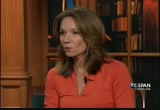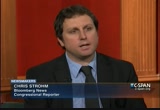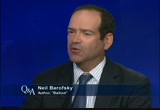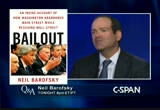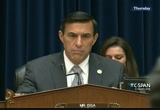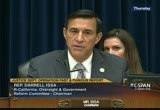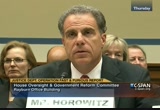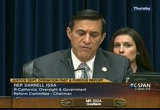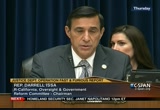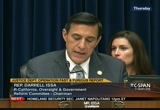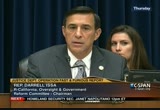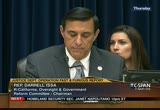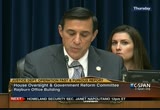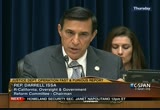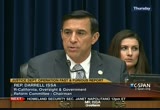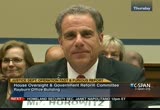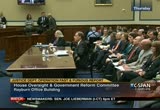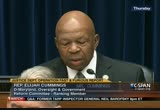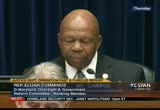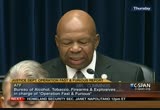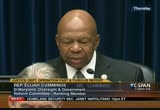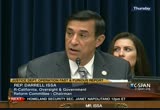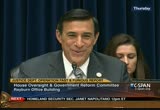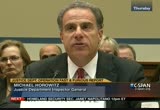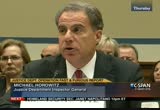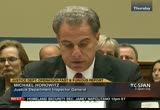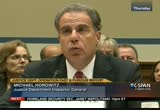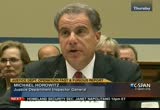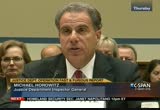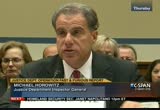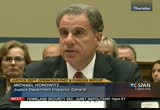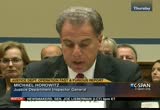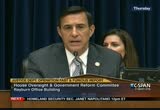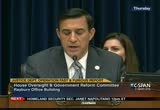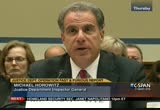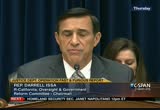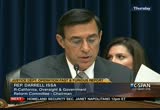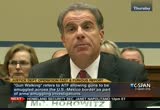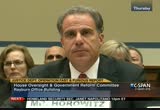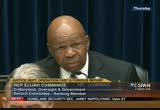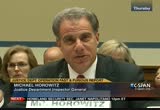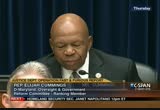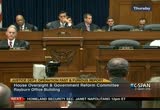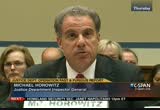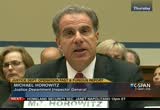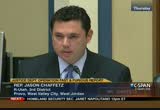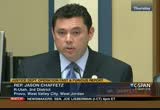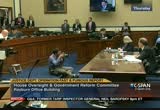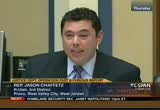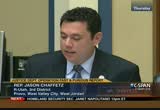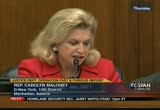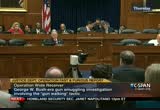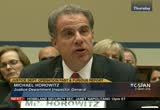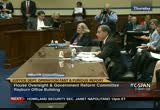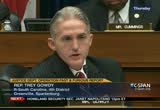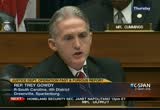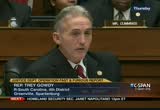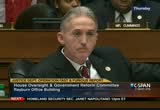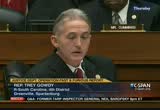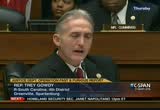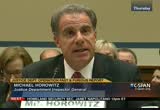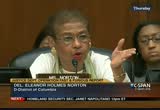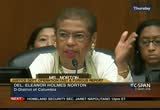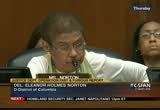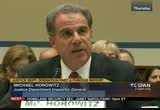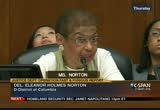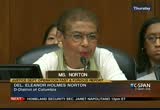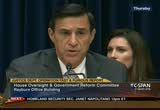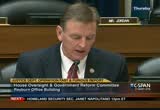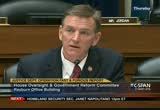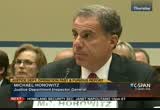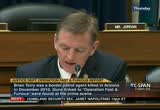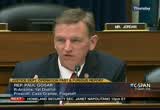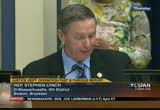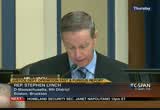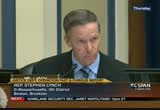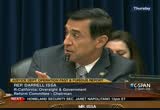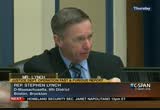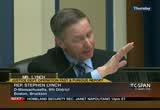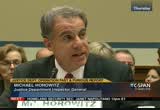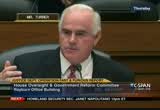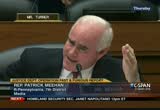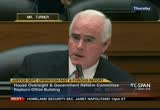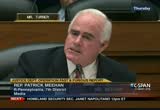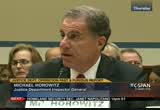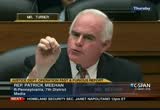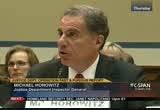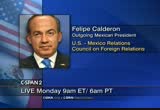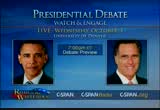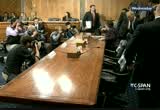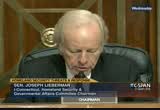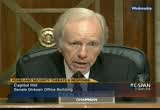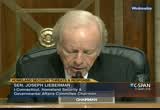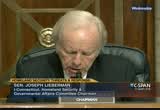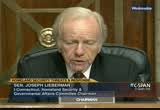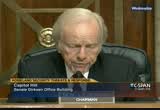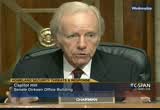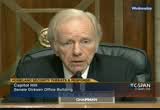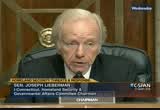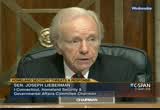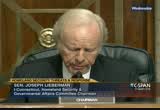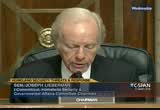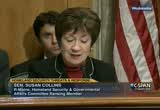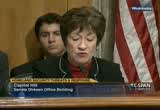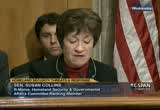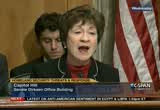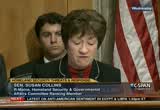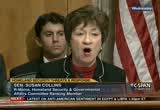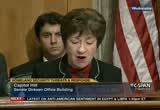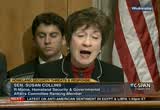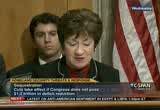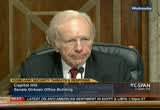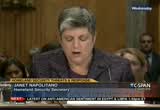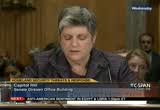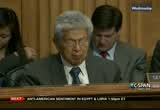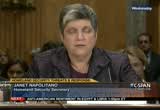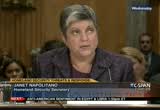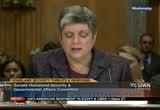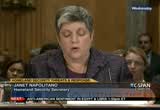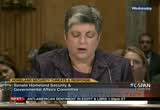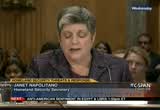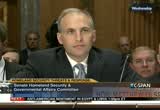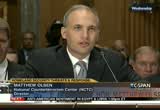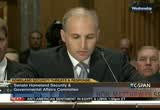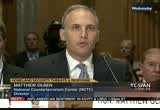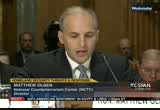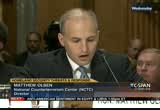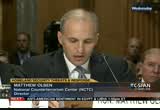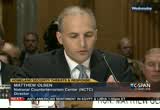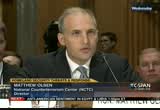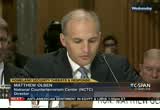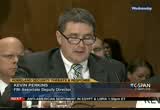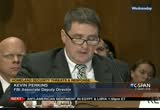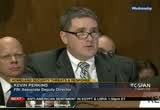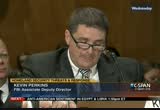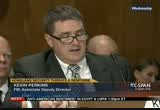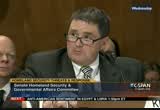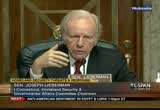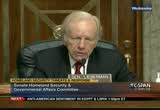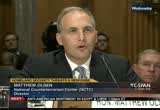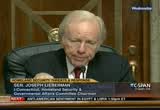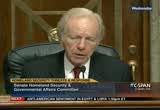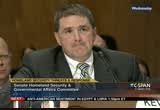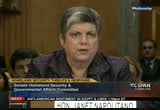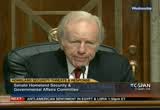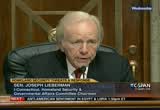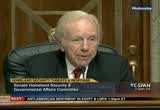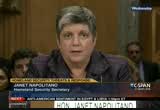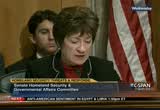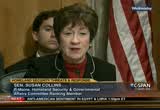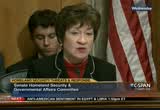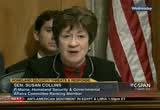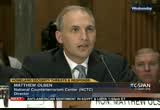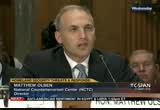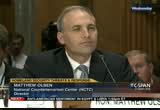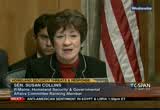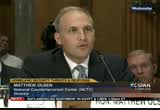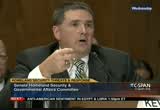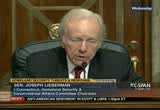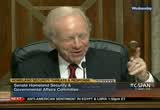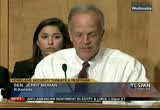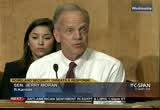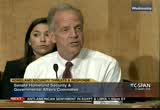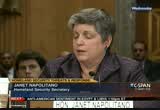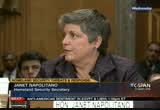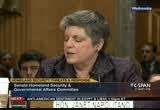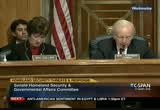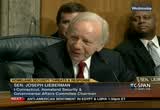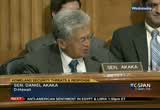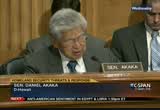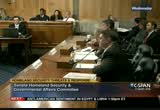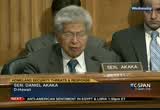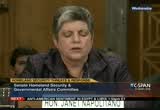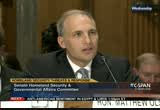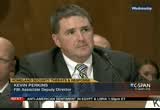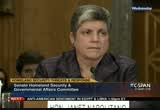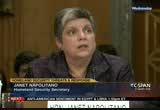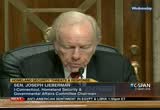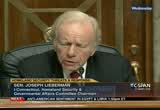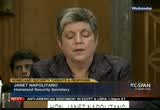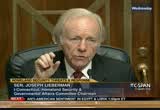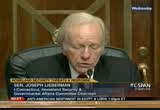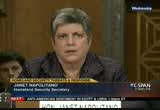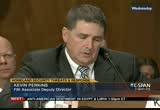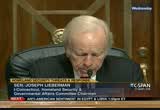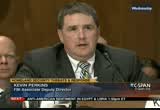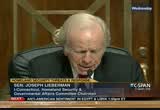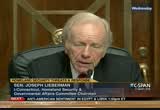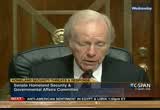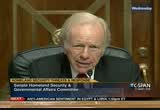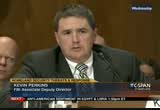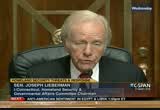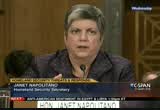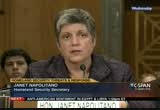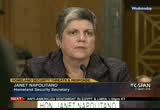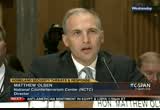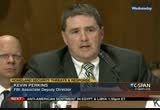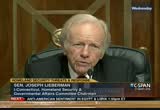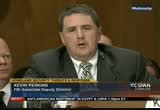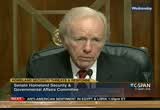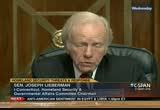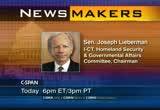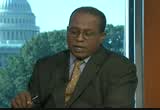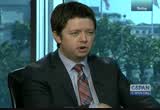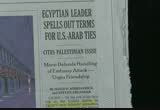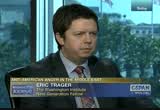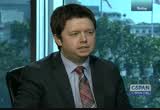tv Washington This Week CSPAN September 23, 2012 10:30am-2:00pm EDT
10:30 am
will do its own investigation. >> as we sit here, congress is wrapping up their session. they're going on a five week recess and then they come back. there were the protests in egypt. we did not talk about that. there is 1 billion in debt relief up in the air. what is happening? >> there are questions whether the at the ministration is one to offer each debt relief and whether the government is going to begin to suspend aid to the u.s. government. there has been a push to do this. i've got one of the interesting things that senator lieberman says was he talked about intervention in the middle east. he thought it would be popular.
10:31 am
>> we are out of time. thank you very much. rafallah sahati el-megaref [captioning performed by national captioning institute] [captions copyright national cable satellite corp. 2012] >> to qe1 senator joseph lieberman tonight at 6:00 p.m. eastern. >> when i came, i did not know what an ig did. we seldom would run into the law enforcement arms. theri was sort of a mortgage frd unit. i did not know the big picture of what an ig was doing. when the things i did was go round and meet the igs. , found the inspector general's although they're supposed to be
10:32 am
the spheres watchdogs looking out for waste, fraud, and abuse, they had really become like any other agency. it was like their budget, how to preserve their budget. they were worried about class clashing with management. it was a get along type of attitude. i kept hearing that there are three types of different igs, a lap dog who would curl up in the lap of management's, a watchdog that was in between, and a junkyard dog. when i was going to the confirmation process i was told that i needed to be like a junkyard dog. >> neil brodsky work to
10:33 am
uncover fraud and abuse. >> now from the fast and furious investigation. he talked about eric holder and the role of justice department officials and the operation. the head at the bureau of alcohol and firearms and one senior justice department officials have resigned since the release of the report. this portion is about 1.5 hours. >> the committee will come to order. please close the doors.
10:34 am
the oversight committee exists to security the fundamental principles. first, americans have a right to know that the money washington takes from them is well spent. second, americans deserve an efficient and effective government that works for them. our duty on the oversight reform committee is to protect these rights. our solemn responsibility is to hold government accountable to taxpayers. taxpayers have a right to know what they get from their garment. it is our job to work tirelessly in partnership with the watchdog to deliver the facts to the american people and to bring genuine reform to the federal bureaucracy. this is our mission. today we are dealing with exactly that kind of situation. the report issued yesterday began with watchdogs and whistleblowers making us aware of a fatally flawed operation known as "fast and furious."
10:35 am
before i begin with my opening statement, i want to thank michael horowitz. i want to congratulate him on delivering an extremely comprehensive and independent report. he is not new to the department, but he is new to this job. as inspector general and a senate confirmed nomination of march 29, and when you were sworn in on august 16, we all asked the question -- can you pick up and do this kind of a job on such a monumental task before entrance? yesterday proved to both sides of the aisle that you could. i want to personally thank you.
10:36 am
i note that ig's served a purpose that we do not get and have not gotten from any administration if not for the 74 ig's and the 12,000 men and women at work for them. the level of transparency and accountability out weights the abuse of power and abuse of discretion and the like that would not be possible. this committee relies on their work. yesterday we were not disappointed. the report released yesterday is a huge step forward toward restoring public faith in the department of justice. i was impressed with the professionalism and the thoroughness and scope of the
10:37 am
report. i know having been all of the day before with his family in arizona were dedicated the border patrol station that he worked out of before his untimely murder in 2010. they too were impressed that a great deal of the closure that they wanted by responsible parties at all levels was met yesterday. the conclusions after 19 months of hard work, of course, are greater than some would want and fall short of what others would want. they cannot by definition bring a complete closure. even the report still has some questions. there were some individuals and some documents that are not yet available. like any document, you have to cut it off and, as you are and
10:38 am
bring with you have. i think this was the appropriate time. i am particularly pleased that we waited an additional week to allow for materials that otherwise might not have been in the report. this committee has had a difficult relationship with justice. much of it because the attorney general, no matter how many times we asked or subpoenaed, no matter how many meetings are staff had, we were unable to get the cooperation necessary. i hope that whoever sits in my chair faces an administration that understands that freedom to openness and openness to the inspector general offices is critical if the american people are to have confidence in their government.
10:39 am
much of what is in the report but not the main subject report has to do with that february 4, 2011 letter in which the justice department falsely stated that in the operation fast and furious, guns did not walk. the only way that thing could beat to it is if you believe guns had legs. operation fast and furious is a poster child for what you do not do with deadly weapons. you do not lose track of them. you do not allowed more of them to go. you are seeing the effects of those weapons killing people in mexico. let us make no mistake, weapons
10:40 am
had already been found at deadly scenes of crimes in mexico before fast and furious was shot down. only the tragic loss of brian terry brought an end to fast and furious. this report will not bring a complete end to the need for us to work with justice to bring genuine reform to the process, it goes a long way toward that. i will particularly note that i am pleased in some cases the executive privilege claimed by the president of united states was not asserted in this discovery. some materials contained in this report help us. but they are many of the items we wished we had received. the conclusions in any report by ig are in fact respectful. since yesterday, two top
10:41 am
individuals who is time to resign had come, 14, 16, 18, 19 months ago resigned, we expected that all 14 would find a way to find appropriate new occupations. ones in which their poor judgment or lack of dedication our unwillingness to read the documents that were required to read would not be held accountable. there is no place in our government for people who under statute are required to do something and then say, i did not do it because someone else did it for me. for the american people to note that ultimately a wiretap application is trusted by a
10:42 am
judge in most cases -- only protection for the american people is in fact knowing that there are safeguards in the application. an agent or application cannot tap your phone or run an application. the safeguards in fast and furious need to know what was known and what wiretaps would tell you that guns were walking. that same safeguard could cause anyone to see their phones tapped when in fact it should not be under the law. a look at the protection is not granted to safeguard against a
10:43 am
fatally flawed tactic by fast and furious. i look at it to know their needs to be material changes in control in how wiretap applications go through a process for approval. over the next several hours, we will hear a lot from our witness and i rely on our questions based off of the report. i believe that given the opportunity to have a fair question and ansr, we understand why jason resigned yesterday and why there is much work to be done to reform the justice department and the firearms agency in order for the american people and the people of mexico to have confidence in this government. finally, nothing in this report indicates anyone. if you touched like, looked, could have touched, could have looked, could have asked for information that could have caused you to intervene, to
10:44 am
complain, to worry, to talk to people, and you did not and you are in our government, you fell short of your responsibility. we all have an responsibility to protect against firearms and not in the hands of dangerous criminals. with that, i want to thank -- >> i want to welcome mr. horowitz and your staff, everyone from the review. i want to make it clear that i join the chairman in expressing our appreciation. we appreciate your work and
10:45 am
excellent way in which they did it. i hope that they are listening. i i thank you again. they have worked on this for more than a year and a half. they have reviewed more than 1000 pages. they did it under the microscope of this environment where some public accusations were made before the search for the evidence began. it was a difficult task. your office did an admirable job. again, thank you. one of the most important things we can do today is recognize the service of border patrol
10:46 am
agent brian terry who gave his life for the country. it can't truly offer solace to his family, i hope that this report will help. i would like to commend chairman issa. we have had many disagreements on how this should proceed, but the committee uncovered a severe problem that has been happening since 2006 in arizona that allowed criminals in mexico and the u.s. to obtain hundreds of guns. this committee played an important role in exposing and
10:47 am
halting these flawed operations. i also want to commend the attorney general. i have lost count of how many times he has testified on this issue. he has remained evenhanded and respectful and true to the daunting and critical mission of the department. he has but numerous reforms in place. i know that the administration did not exert executive pillage over any part of the inspector general's report. in fact, the department went a step further. i think this is a positive development. i have always believed, and i continue to believe that the committee and the department can resolve any lingering issues about further conflict. i urge the committee to reconsider its position and settle the remnants of this
10:48 am
dispute without resorting to unnecessary litigation that nobody in this country wants. with that, let me turn to the report in order to highlight several key points and raise some specific questions. there can no longer be any doubt about gun walking under the previous said ministration. it finds that atf agents simply let done is what. affidavits contain just as much detail as those in fast and furious. the report includes, these tactics were include rejigger used by atf more than three years before operation fast and furious. there can be no any doubt -- camino doubt that gun walking was authorized to approve by the attorney general or senior
10:49 am
department officials. . it was primarily -- in his written testimony for today's hearing, he says they share equal responsibility for the strategic and operational failures in operation wide receiver and fast and furious. with these points in mind, i have too broad questions which i hope you will address. first, how could this tactic have been used for so long, over the course of five years, in two administrations, without a field office in phoenix or the u.s. attorney's office in arizona stepping in to halt it?
10:50 am
what allowed it to go on for so long unchecked? second, what should we do now to ensure that this never, ever happens again. i note the ig has made his recommendations and i have made my own. which of these recommendations have already been implemented, which should be pro or it is -- prioritize, and which may require legislation? i thank you again and your staff or an excellent job, and with that, i yield back. >> i thank the gentleman. i now ask unanimous consent that the gentleman from arizona be allowed to participate in
10:51 am
today's hearing. >> without objection, so ordered. >> i also would reserve the right to remembers sitting on the day as will be recognized only after all other individuals on their side of the aisle are recognized on a back-and-forth basis. i would like to thank mr. barber for making the effort to be there and for representing that area of arizona that i think is so affected by fast and furious. pursuant to the rules, all witnesses before this committee will be sworn so i would ask that our witness please rise and take the oath. please raise your right hand. do you solemnly swear that the testimony you are about to give will be the truth, the whole truth, and nothing but the truth? with that, the record will recognize that mr. horowitz answered in the affirmative. >> gently, we normally talk about the five minutes. take the time you need to give us your opening, recognizing that it will be a long day of
10:52 am
additional opportunity for you to answer questions not in your opening. with that, the gentleman is recognized. >> thank you, mr. chairman. i have pared that down somewhat so that i don't go on for 20 or 30 minutes and i will try to stick to the five minutes, certainly. good morning, and thank you to the members of the committee for inviting me to testify today about the report released yesterday, which details a pattern of serious failures in both atf and the u.s. attorney's office in handling the investigations and fast and furious and wide receiver and the justice department's response to congressional inquiries about those lot operations. this is my first opportunity to testify before the congress since i was sworn in five months ago and it is an honor to be here today. during the confirmation process, i made a commitment to the congress and to the american people that i would continue the strong tradition of my
10:53 am
office for independence, not partisanship, impartiality, and fairness. those are the standards that i and my office applied in conducting this review and in preparing this report. as in all our work, we abided by one bedrock principle, to follow the facts and the evidence wherever they lead. as indicated previously, this report could not have been done without the extraordinary dedication of the staff and the employees in my office. that worked long nights, weekends, free vacations, and i could not thank them enough, and i appreciate the committee thanking them for their hard work. as indicated come up reviewed over 100,000 pages of documents here. we interviewed over 130
10:54 am
witnesses, many on multiple occasions. the witnesses we interviewed served at all levels of the department from the current and former attorneys general to the line agents in arizona who handled the investigations. very few witnesses refused our request to be interviewed and where they did refuse, we noted those in the report. the justice department provided us with access to the documents we requested, including documents from post february 4 concerning the department's response to the congressional inquiries. we operate with complete and total independence in our search for the truth and the decision about what to cover in this report and the conclusions that we reached were made by us and our office and by no one else. i am pleased that we have been able to put forward to the congress and to the american people the full and complete
10:55 am
recitation of the fact that we found and the conclusions that we reached, with minimal reactions by the department to our report. the administration made no redaction for executive privilege, even though our report evaluated in detail and reaches conclusions about the department's post february 4 actions in responding to congress. additionally, at our request, the department has agreed to seek court authorization to underreact as much of the wiretap information as we included in this report as possible. the court agrees to the department's request, we will shortly issue a revised version of the report but that material unredacted. the investigation that became known as operation fast and furious began on october 31, 2009. by the time the indictment was announced on january 25, 2011, over a year later, atf agents had identified more than 40 people connected to trafficking conspiracy that was responsible for purchasing over 2000 firearms for approximately $1.5
10:56 am
million in cash. it atf agents seized only about 100 of those firearms that had been purchased. numerous firearms that had been bought by straw purchase shoes were recovered by law enforcement officials at crime scenes in mexico and in the united states. one such recovery occurred on december 14, 2010 in connection with the tragic shooting death of a federal law enforcement agent. u.s. customs and border protection agent brian terry. shortly thereafter, the flaws in operation fast and furious became known, as results of the willingness of a few atf agents to come forward and help it did tell what they knew about, and as a result of a convoy out of the investigation by the congress. on february 28, the attorney
10:57 am
general requested my office to conduct a review of operation fast and furious, and we agree to do so. during the course of our review, we received information about other atf firearms trafficking investigations that raised serious in questions about how the were conducted. we concluded that both operation white receiver and operation fast and furious -- wide receiver and operation fast and furious were seriously flawed. most significantly in their failure to adequately consider the risk to the public safety in the united states and mexico. both investigations saw to identify the higher reaches of firearms trafficking networks by deferring any overt law enforcement action against the individuals in straw purchases, such as making arrests or seizing firearms, even when
10:58 am
there was sufficient evidence to do so. the risk to the public safety was immediately evident in both investigations. almost from the outset of each case, atf agents learned that the purchases were being financed by violent mexican drug trafficking organizations and that firearms were destined for mexico. yet in operation fast and furious, we found that no one responsible for the case, either at the phoenix steel division or at the atf headquarters or in the u.s. attorney's office raised a serious question or concern about the government's not taking earlier measures to disrupt a firearm trafficking operation that continue to purchase firearms with impunity for many months. we also did not find any persuasive evidence that
10:59 am
supervisors in phoenix, at the u.s. attorney's office, or at atf headquarters, raise serious questions or concerns about the risks that public safety posed by the continuing firearm purchases or by the delay interesting individuals who were engaged in the trafficking activities. this failure, we found, reflected a significant lack of oversight and urgency by both atf and the u.s. attorney's office and a disregard by boat for the safety of individuals in the united states and in mexico. our review revealed a series of misguided strategy, tactics, errors in judgment, and management failures that permeated atf headquarters and the things bill division as well as the u.s. attorney's office and headquarters of the department justice. in the course of our review, we identified individuals ranging
11:00 am
from line agents and prosecutors in arizona to senior atf officials in washington d.c. who bore a share responsibility for atf's knowing failures in both of these operations to interdict arms illegally destined for mexico and for pursuing this risky strategy without adequately taking into account the significant danger towe alse part officials related to these matters, including failing to respond accurately to a congressional inquiry about them. based on our findings we made six recommendations designed to increase the department's involvement in an oversight of atf's operations, to improve coordination among the department's law enforcement component, and to enhance the department's wiretap application review and authorization process. the inspector general's office intends to closely monitor the department's progress in implementing these recommendations. finally, we recommend that the department review the conduct and performance of the
11:01 am
department personnel that are referenced in the report and determine whether discipline or other administrative action with regard to each of them is appropriate. thank you again for the opportunity to be here and i look forward to answering any questions that the committee may have. >> thank you, mr. horowitz. i will recognize myself for a few questions. you are given a great deal of access in order to do this, over 100,000 pages. would characterize -- would you characterize, were all 100,000 pages ones that you would have made available to this committee review deciding to have to see those documents? we receive less than 8000 pages. >> i did not obviously go through the 100,000 pages. >> i will ask it in reverse. do you know of agents that you saw that congress should for good cause beat denied -- every document we ask for an reviewed
11:02 am
and cited in this review we found relevant and important. >> early what we have seen and we asked for and saw, we determined was relevant. >> it would be fair to say the documents were post february 4 that you evaluated and help you prepare this report in which executive privilege was not claimed were relevant, the use them, and they should have been provided to congress in the ordinary course. they are being provided in directly at this time. >> with certain found irrelevant. >> there were a number of people you did not get to speak to. mr. cunningham's spoke to you and then later would not speak to you. kevin o'reilly, can you tell us a little bit about your efforts to try to interview kevin reilly, a member of the national security team?
11:03 am
>> we reached out to his lawyer, requested an interview. we have no basis to compel interviews from individuals who are outside the department of justice. he does not work in the department just so we had to ask for a voluntary interview, and his lawyer told us he would not appear voluntarily. >> would it surprise you that he has been in afghanistan and we have been denied even the ability to serve him a subpoena. >> i was not aware of where he was but i was told by his attorney -- i don't recall knowing where he was, but we were told he would not appear voluntarily. >> also, there was a full-time employee of the department of homeland security. would you explain your efforts to interview that individual? >> there was an agent from the department of homeland security that was assigned to the operation. as part of our ever to be
11:04 am
thorough an interview all people who might have information, he began -- he again is out of the part of justice, so he declined are voluntary request to be interviewed by us. we saw for the department of homeland security to speak to him and we understood that absent being compelled that he would not speak voluntarily, and that request was decline, is my understanding. >> i admonish to everyone to stay on to this, but in this case i want to go outside the scope of this somewhat. we are the committee that will oversee a change in the ig act if there is one. in your opinion, if the i.t. act that created a mechanism for you to fully that these requests, even if these were individuals outside of your particular narrow agency, is that something you believe would be helpful, speaking as an ig, for future investigations?
11:05 am
>> certainly, we would have used whatever portis we had to seek testimony from individuals, as we were able to internally with the justice department. having extended authority would certain have allowed us to take initial actions here. >> we may wear by secretary napolitano that the department was unable to have an individual who worked in an event, one that killed one of her charges, why she would not insist that that individual speak to you in an investigation? >> i don't know personally that information, mr. chairman. >> it has been said by many, mostly on the other side of the aisle, that there is nothing in these wiretap applications that would have caused senior officials to see any red flags as to the reckless tactics.
11:06 am
i realize these documents are not unsealed. would you characterize for us whether you would say, as to report does, and i will read this but i would like to elaborate. your findings that wiretap applications approved by senior officials did contain red flag about reckless tactics to should have acted on this information, and it goes on. are we to conclude that in fact, if you read one or more of these 14 wiretap applications, you should have known that guns were walking? >> as we set in the report, and i also reviewed the 14 applications, believe that if you are focused and looking at the question of gun walking, you would read these reports and see many red flags.
11:07 am
>> in your report, there was an area i focused on a little bit where it implied that lanny brewer did not respond or did not acknowledge the february 4 letter. is it not true that lanie brewer in fact entered good job is -- as at least an answer acknowledging he had received it and made that comment? >> that is correct. >> was he in effect on his way to mexico city to sell the mexican government on what was effectively a gun walking program, coordinated with them? >> my understanding was he was in mexico and he had raised the possibility of some program involving cross border cooperation based on tracking activity, but i do not have more knowledge on that at this point.
11:08 am
>> thank you very much. i just want to walk for some quick points with you and then ask you to respond in more detail to some broader questions. you examine operation wide receiver in the bush administration and operation fast and furious, which was in this administration, is that right? you found that gun walking was involved in both operations, is that correct? >> that is right. >> we are talking about atf agents letting guns walk in both operations, is that correct creston arthrex correct regret to report said this, "operation wide receiver was noteworthy because it inform our understanding of how these tactics were used but atf or than three years before operation fast and furious was initiated." is that would your report said? >> that is.
11:09 am
>> you also found that neither attorney general mukasey nor attorney general holder authorized or proved gun walking, is that right? >> that is corrected attorney general mukasey was sworn in after the completion of the investigative portion of the activity. >> you found that the wiretap applications in the white receiver included the same kind of potential red flags found in the fast and furious applications, is that correct we found red flags existing in receiver as well. >> you interviewed officials from both administrations and they told you that normal practice was to read only summary memos, is that correct? >> we interviewed three of the
11:10 am
five deputy and all the three that we interviewed -- all three indicated that they could not -- they did not routinely read the affidavits when they came to them. >> we need to make sure they read the affidavits, would you agree? >> i absolutely agree, and i remember reviewing them. >> you found a gun walking was not ordered from the top but instead was "primarily the result of strategic and tactical decisions by the agents and prosecutors."
11:11 am
he said in your testimony "they share equal responsibility for strategic and operational failures." peerman questions. i think these questions will go to the heart of the reform that i hope we will be able to get underway. how could these tactics have continued in phoenix over a span of five years and two administrations without being visited by atf or the attorney's office in arizona? how should it have worked, and if an atf agent came to phoenix with this kind of plant today, how should it be examined and that it now? >> as to the first question, i think there were a serious lack of controls in place in both the u.s. attorney's office and atf operations. primarily atf, because they are the law enforcement agency that
11:12 am
needed approval. the attorney general guidelines for these undercover operations were never amended to cover a kia. though there were a series of failures in the controls. we have made significant recommendations in that area. the department and atf have put in place additional tools and control already, but there has to be a serious review of operations like this that impact not only the number of guns in the communities that are impacted by these but that involved a foreign operation, and guns gone to a foreign country. that was not there at the time. there needs to be a serious look at that. i to prevent that going forward is watching carefully to make sure the reforms we are talking about not lost one of the
11:13 am
headlines of the report go way, that there is oversight and follow-up by the inspector the general's office and by the congress in this regard. >> one last question. mr. nelson, who is heading atf, from reading the report, it seems like he may have fallen asleep at the switch. from what you saw, again, this is the head of atf. how much can you tell us about what the report says about that? >> we down in operation fast and furious that there was significant information coming to atf headquarters. in fact, by march of 2010, the deputy director of atf, who was an experienced agent, for the first time in his career asked for an exit strategy because of his concern about what he had seen.
11:14 am
he asked for but did not come for -- did not come to headquarters for six weeks. it was not reviewed by the deputy director until almost a year later, after the shooting of agent terry and after the indictment occurred. the fact that the deputy director could see the need for an exit strategy in march of 2010 and not receive it and review it until 2011 i think speaks volumes about what happened here in terms of failures of oversight. >> i thank the gentleman. with that we recognize -- with that i ask unanimous consent, the general lady from florida. but that we go to the gentleman from utah. >> appreciate your tenacity. we have a dead border patrol agents, a mexican helicopter shutdown, a dead border patrol agent, hundreds of guns that are still unaccounted for, untold
11:15 am
numbers of crimes that have been committed with these guns, an attorney general is best argument is that -- is a plea of ignorance. i think, mr. cummings, the ranking member asked the most prevailing question. how does this go on for so long without someone saying something is improper? the acting atf director is in that position for two years and met with the attorney general one time. one time. that is inexcusable in my book. i also think the conclusion validates what we have been concerned about for so long. the head of the criminal division is supposed to be lanie brewer, but lanny brewer, having been briefed on what happened previously, knew about gun walking and said nothing about it. it did not issue and you eat that said we are not going to do this anymore.
11:16 am
in fact, we could be led to believe that just by allowing it to continue on, that he was actually endorsing this. i think this is a wonderful report. i appreciate its thoroughness. i think you were a little soft on lanie brewer. to suggest that he did not supervise operation fast and furious and did not authorize the activities in the investigation, i would disagree with that statement. place in line steam reported to lanny brewer. as this -- adjacent winds been reported to lanie brewer, and -- jason weinstein reported to lanny brewer. a letter that was totally false about the atf activities -- the letter does not even mention fast and furious. says that these guns were allowed to walk, that atf does not allow guns to what in any way, shape or form. i would port to the february memorandum about oregon to mexico.
11:17 am
in mexico, he proposed to the mexican government, his suggested allowing stock purchases to cross into mexico. we have in black and white a document suggesting he is not only approving of these types of activities, he is advocating for these types of activities. to answer mr. cummings question, it is crystal clear. the head of the criminal division was out -- down there pitching to mexico that we ought to be doing more. the person in charge was advocating for it. he knew about it previously and
11:18 am
when he did hear about it, he did nothing about it. he had seen it and he said nothing about it. after the letter goes out, everybody at the department justice knows is wrong. it takes 10 months for them to fess up on it. mr. chairman, i would highlight what is that on page 277 by the inspector general. we found the affidavit described specific incidents that would suggest to a prosecutor who was focused on the question of investigative tactics that the atf was employing a strategy of not interdicting weapons are wresting the straw purchasers. the attorney-general testified in the judiciary committee in response to congressman quell, i have looked at these affidavits and there is nothing in those avens as i review reviewed then the said don -- nothing in those affidavits as i review them and that set gun walking was allowed.
11:19 am
mr. chairman, i am concerned there was a culture and environment where people are either afraid or not willing or did not want to share with the attorney general key information specific to what we were doing with mexico. i will highlight the culture and environment was not conducive to have the truth surface. it is shocking in troubling to me that we did not -- the department of justice never communicated to the senior people in homeland security where one of their agents was dead. the secretary of homeland security did not ask the attorney general what was going on, nor did he ever communicate with the secretary at the state department so she could deal with the situation. we pour thousands of weapons
11:20 am
into mexico l whenever father to tell the secretary of state? that is one of the things we have to look at because that is one of the compounding problems we have. even after we knew all these facts, i don't think that our justice ever saw it. >> with that we recognize the gentle lady from new york for five minutes. >> first of all, i would like to welcome the ig and note that he is from the great state of new york do we are very proud of you, even though your now a washingtonian. congratulations on your public service. we appreciate very much to report. if you were so concerned about guns at the border, my colleagues could have supported the bill that we put forward for gun safety. in my opinion, you are not serious.
11:21 am
if your worth of bonds before, then let's make it a federal crime to traffic guns. let's make it a crime for sales of these guns. let's ban assault weapons that are not used to do anything but kill people. they don't kill animals, they just kill people. there are number things we could do right now that would get the guns off the border. the mexican government supports it. that vast and to do so. we got a letter from the president of mexico saying this is wonderful, that will help bonds on the border. i would like to do what the chairman on the, which is to focus on this excellent report that mr. horwitz came out with. in december 2011, our attorney general explained to the house judiciary committee that gun walking in operation fast and furious originated with the local phoenix office of the atf and u.s. attorney and that it
11:22 am
was not the result of any strategy or directive from the main justice. he said the notion that people in washington, the leadership of the department, through the use of those tactics and fast and furious, is simply incorrect. this was not a top to bottom operation, this was a regional operation that was controlled by atf and by the u.s. attorney's office in phoenix. mr. horwitz, report reaches a similar conclusion, pointing back to the genesis of these tactics by the field agents, the prosecutors in phoenix. this is what your report says about operation wide receiver. "in sum, the evidence demonstrated that that decision to not introduce the firearms,
11:23 am
this -- is by having probable cause to do so, was a decision made by the atf the steel division and was intended to advance atf's broader goal of identifying additional participants in the conspiracy." so my question to you is, the main question that we have, is how is it that these tactics started? what went wrong? can you explain what he founded investigation that would explain how these tactics first started being used in operation wide receiver? cracks in operation wide receiver, what appears to have occurred is that information came to the agents in the tucson office of the phoenixville division and they made a
11:24 am
conscious decision to not take any action to stop the trafficking with the straw purchases because they wanted to follow the guns and figure out to whom they were ultimately going. that was a decision made early on in the investigation, almost at the outset. it was done with the acquiescence and approval of the u.s. attorney's office, so that is what we found that there was a failure by both offices. but the net with the office in phoenix? but the u.s. attorney's office for arizona. >> what about the operation fast and furious? did the agents have that motive, or did they just failed to consider the public risk involved? what were they thinking? >> they did not have bad motives, as far as we found. what we heard from the agents what they made a conscious decision that a long-term effort, having a long-term
11:25 am
investigative strategy to dismantle a large organization was the greater good that they were undertaking, to dismantle the organizations, stop the trafficking, and that was what they believed was in the best interest of public safety. as we found, that was an incorrect calculation. law enforcement's primary objective, he cannot take action to let guns walk. >> what can we do to make sure this does not happen again? >> there needs to be serious reform in controlled we have outlined at atf. there has to be an internal change to how cases are managed there. there needs to be supervision. there needs to be oversight. and thoughts about investigations like this need to be carefully reviewed at the highest levels of the organization at the outset, not defer to the line agent or their line supervisor. to me, that is the first and most important reform.
11:26 am
>> that is a step that has to happen. there are many other reforms we have outlined, including, for example, making sure that at the department of justice, there are reviewing our tech applications when they get them. there needs to be clear policies in place within atf into what is allowed and what is not allowed. not just reviewing and vetting, it is a clear line as to what is and is not permitted. >> we now recognize the gentleman from south carolina. >> when i met with you several weeks ago, i left that meeting cautiously optimistic that we would receive a thorough, balanced report, and my optimism was rewarded. i also shared -- your gratz as a prosecutor gave me that cautious optimism.
11:27 am
this was never about politics to me. i don't care which party is in power. it is about a dead border patrol agent and holding the institutions of government responsible for what they have done. i think it is wonderful at one level that we have an independent entity like you to investigate. i just thought that was what the department of justice was. i naively thought the attorney general, as the top law- enforcement official at the department justice was that independent entity that we could trust. whether it is the letters in march, in february 2011, or testimony delivered to committees of congress, sadly, the departure of justice was not vindicated. wiretap applications, i am specifically asking the attorney general, are you sure someone
11:28 am
reading this wiretap applications would not be led to the conclusion that done walking was used. your report debunks that. you used to read wiretap applications, correct? and your conclusion with that background is that are reasonably prudent person reading these applications would have been on notice way back when that the tactic of gun walking was being used. is that correct? >> yes, for someone who was watching it, looking for it in that context, i agree it would have seen those red flags. >> that was a startling conclusion that you reached. another startling fact that you included in your report, and correct me if i mischaracterizing what you wrote, but the attorney general, even today, does not believe that a dead border patrol agent from an agency that he does not
11:29 am
supervise, who was killed by weapon as part of that investigation of an agency that supervises is something that should draw attention. do your report which even today the attorney general is not sure that this should have been brought to his attention. >> as we included in the report, the attorney general told us it would not necessarily be something he would be expected to be notified of. we are talking about not the death, because he was notified about the death, but the fact that to firearms were found at the scene that were connected to operation fast and furious. >> when you have a deadline for not offer, the next words out of your mouth are, i want to know everything there possibly is to know about how this happened. i don't just want to know what the autopsy says. , to know how we got to this
11:30 am
point. it speaks to duty to supervise, not just a common-sense duty. i like to ask specifically about the code of professional responsibility. is there a duty to supervise, for supervisors attorneys to supervise the work of those underneath them? not commonsensical obligation, but is there a code of professional responsibility, obligation to supervise? >> i am not sure i could speak directly to the code of professional responsibility in that regard. we were looking at where there were supervisory failures. we found there is clearly an obligation as part of burress -- performance responsibilities of the agents and supervisors. a fella to do that was a serious management failure, in
11:31 am
our estimation -- the failure to do that this is serious management failure. >> you can argue that were calculated to mislead, but there can be no argument that they were faults. the largest exception i take your report is the same one that mr. chafetz had. lanny brewer was responsible at some level for the approval of the wiretap applications. lanie brewer reported this february 4 letter, which was demonstrably false, to a home computer. you don't have to be real good prosecutor to deduce that you forward something to a home computer because you are going to read it. i cannot think of any other reason to forward a letter other than to read it unless you are a historian or an archivist. then he confirmed our suspicions by writing "good job." given the failure to connect the dots, i just find it -- i cannot imagine headline that read passengers charged with speeding, driver exonerated.
11:32 am
we had people under lanie brewer who work resigning are being dismissed. how does he escape this? >> we found that -- how does he escaped this? >> we found that mr. brewer in april 2010 learned about the gun walking in wide receiver. atf reports to the deputy, not to him, so it was incumbent upon him, in our view, to reported to the deputy and the attorney general. when the letter came in from senator grassley nine months later or so in january 2011, we believe, as the altman testified, that he should have alerted the department to that.
11:33 am
those were the findings we may. as to what the discipline and decision is as to discipline or administrative or other conduct, that is really a decision ultimately under our system to the attorney general. i have the authority to investigate, make the findings, which i did, and then is that to the attorney general to decide what, if any, discipline to impose. >> thank you, mr. chairman, and mr. horowitz for the very thorough job you did. i appreciate the way you connected the dots and drew the line so we understood where there was instability. my line of questions really goes to why this investigation has gone on for so long and why the public was concerned about it. the face of this investigation, the poster boy, as it were, has been the attorney general of the united states. the committee has had hearings
11:34 am
where over and over again, it was alleged that gun walking was known at the highest levels, even by the attorney general, and it was an approved plan at the highest levels of the obama appointees. i think it is only fair, when the attorney general over and over again has been the face of this investigation, the one held responsible for the gun walking, to put on the record what you have found with respect to the attorney general of the united states.
11:35 am
you have indicated they you receive cooperation from the highest levels of the justice department in doing your investigation. >> yes, we receive the documents that we ask for and is indicated, other than a handful of individuals who refuse to speak with us, we generally were able to speak with everyone wanted to. >> did you speak with the attorney general of the united states? >> we did. cracks may ask you, did you find any evidence that attorney general holder approved of the gun blocking tactics that are under investigation by this committee?
11:36 am
>> as we outlined in the report, we found no evidence that the attorney general was aware in 2010, before senator grassley letter, of operation fast and furious and the tactics associated with it. glaxo he could not have approved because he did not even know about the gun walking tactics before 2010 para >> we found no evidence that he had been told about that. >> let's go to other high levels of the justice department. did you find any evidence that the acting deputy new or authorized by unlocking?
11:37 am
>> we found that the acting deputy attorney general was briefed about operation fast and furious of march 2010, but we concluded after looking at what that briefing involved, which was item 4 of a seven item agenda in a 45 minute briefing that it was not a sufficient briefing to put him on notice, directly and expressly, that gun walking had occurred. we thought it was sufficient to trigger questions but not sufficient to put him on notice. we were troubled by the fact that he was never briefed again by atf. two weeks after that brief and, he had asked for the exit strategy. no one went back to him to tell him that information. >> so this controversy centered in the u.s. attorney's office and at the atf, your last answer, does that mean that the decision to keep the active attorney general to know about the parts of fast and furious that are most controversial? >> we did not find any evidence
11:38 am
of deliberateness. this is a situation where the deputy director of a tip that ask for an exit strategy in march and never looked at it until 2011. it would be hard to explain what was going on or what people were thinking given that level of failure of oversight. >> to your knowledge, is anyone at the justice department looking into, perhaps, the most important tool in the u.s. attorney general could have, but tool that might have been useful to the u.s. attorney in dealing with the gun walking, or are we left at the end of this
11:39 am
investigation with gun walking and whatever else anybody can think of to do something about it? is there any were going on in the justice department as a result of your investigation to give atf or the u.s. attorney in arizona hear the kinds of tools that would mean that nobody would even think about a surreptitious way to get a gun, like gun walking in fast and furious? >> what i have been told are the reforms needed within atf, within the justice department's review of wiretaps. beyond that, i have not been informed of any additional steps the department can take. >> we now go to the gentleman from arizona and would ask you to yield for 15 seconds. is it not true that the then chief of staff that the attorney general should have been briefed related to what they do about fast and furious, and obviously the question if fast and furious led to brian
11:40 am
terris murder. >> mr. horowitz, thank you. as my previous colleague says, i grew to when he came to talk to me, and thank you very much for instilling some trust. inner discovery with witnesses, paperwork, did anyone within the doj system raise questions about the truthfulness and possible misleading testimony that is being presented by at their interviews. >> did you directly ask the question? >> i would have to go back and look at the transcripts. cracks in detailing with lanny
11:41 am
brewer, it is my understanding -- mr. brewer said members of the criminal division to review the auspices and directives of information wide receiver. >> correct. >> i am a dentist, but this is even worse than what operation wide receiver would have been do you know the outcome here, and you are still permitting it to go. >> i believe it is april of 2010 that the meeting occurs where mr. brewer is informed that there is going to be meeting and his deputy goes to that meeting to discuss the unlocking and wide receiver. that is with mr. hoover, the deputy director and deputy
11:42 am
director mcmahon. >> all these pieces are. the brewer that he knows about this early on -- all these pieces are pointing to mr. brewer. i have a problem with this with mr. brewer because he is directly in the line of fire, from what i am seeing, and he's got problems. he listens to the presentation and almost gives the thumbs-up with no caution flags at all. just like the wiretaps, these are alarming discoveries. >> it is clear that mr. burr what the where and april 2010 about gun walking from wide
11:43 am
receiver, which is why we were troubled by the decision to not tell the attorney general about it because they have authority over atf and he does not. >> i think the scrutiny on fast and furious is much higher than wide receiver was. you already know the results and you are making the results even worse. >> that is why we were troubled when the information came to the department from senator grassley in january 2011 that those dots were not connected by mr. brewer and by his deputy, mr. weinstein. >> the day after brian terry was killed, the attorney general emailed three people, did he not? >> i believe it was the day after. >> the failure to notify him about the connection between the two guns found at the
11:44 am
scene, that they had been bought 11 months earlier by subject identified in fast and furious. >> when a lobster is murdered, there are a lot of questions being asked. we have a whole scenario of things that occurred here. the question should have been asked and we should have had a better outcome. there was another incident in arizona in late january. questions were abounding, was one of these guns being used? we should have known the gdl attorney-general testimony to maecenas flawed. we would have been asking and
11:45 am
should have known much earlier about the questions, based upon the inquisition of the witnesses to these crimes. and the nature of these crimes and the audacity of these crimes, particularly to hire members like congress. >> as i indicated in the report, we certainly, when that information about guns connected to the shooting scene of a law enforcement agent, that kind of information needs to go to the attorney general of the united states. >> so it was covered up. >> i don't know whether it was covered up or not, but it was not told to him. >> i thank the witness for the very thorough report. extremely thorough. churchill might say that this report defends itself against the risk of being read by its
11:46 am
very linc. however, i am working my way through it, going through its in great detail. you do dress a lot of the questions raised here in five or more hearings. i just want to ask you one point, though, about vindication. some are saying people are vindicated and some are not. in prior hearings, the accusations were against the attorney general. attorney-general holder had come before the committee several times, also over in the senate. the allegation was the allegation was that he knew about the operation, he ran it and the blame lies with him. i read your report is said there was no evidence that he
11:47 am
knew. you do accurately pinpoint people who are ultimately responsible. you identify the flaws in their thinking, their misguided strategies, their misguided tactics and how they made mistakes during the whole process and was a terrible and tragic mistake. in fairness, there were cross allegations against the attorney general as well that he knew more about when he was an office as attorney general, yet after the fair analysis, there was no evidence that either attorney general holder or
11:48 am
attorney general mike casey knew about the operations. do you believe this report vindicates attorney general holder and, fair enough, attorney general mccasey given their lack of information about what was going on. >> i think the record speaks to what we found and our conclusion. i will stand by the very lengthy i agree with you report. without trying to reach characterize it today myself. -- recharacterize it myself. >> i think your point is extremely good that nowhere did we find specific incrimination of if they knew either one of these attorneys general. i think that is an important. and when the committee should be aware of. i do not think anyone should have us and that they knew. we all wish any attorney general would ask to know more. the inspector general's reported does cast blame for high ranking people.
11:49 am
neither were found to know it. >> reclaiming my time. >> we stopped the clock for that question. >> thank you for that courtesy. this is a big agency. we have thousands of employees. at least the report indicates an assistant deputy attorney general in won a division who failed to report, failed to report -- failed to inform his superior. the implication is the u.s.
11:50 am
attorney general should know what every single assistant deputy attorney general nose and fails to report. i did not vote for it, but this congress had just held the attorney general and content, the house did. based on this report, the suggestion by many and some in this committee is the attorney general was withholding affirmation because he was involved. this report is very thorough, very well done report, and partial and objective of based on documents not available to this committee, interviewed multiple times have concluded that was wrong. that was wrong. this attorney general while not perfect was not guilty of the things that people on this committee and others in the press accused him of. that is secondary.
11:51 am
>> could you get to primary? >> the changes that have been made at atf, ultimately the primary objective here was to pay respect to brian terry's service to this country and his family. can you tell me whether the reforms to atf that will prevent another agent to press on the uniform for this country and served this country could be protected now because of the changes made by the atf said something like this does not happen to another american on the customs and border patrol? >>atf steps are important first steps.
11:52 am
we recommended those and we will call -- we will make sure they are put in place. >> the question about people in forming or should have informed the attorney general -- i think he would like to have an answer to the change. >> we struggle to understand how an operation of this size and importance that impacted another country like it they could not have been briefed on to the attorney general of the united states. it should have been. it was that kind of a case. >> we now go to the gentleman from pennsylvania. >> thank you, mr. chairman. thank you for your continuing good work on behalf of the department of justice and the united states of america. you could huff -- you could not have tea off my question any better than asking about the failure to report this up the chain.
11:53 am
going back to april 12, this is an e-mail that comes from deputy attorney general weinstein. it goes with the prosecution memo from operation wide receiver. these are his words. i ensure -- i am stunned what we had to do to make sure not a single weapon walked on an operation i have been involved in planning. we need to go over these issues with our front office. we owe it to atf headquarters to preview these issues before anything gets filed. let me ask a predicate question. with complete knowledge that guns have been what, that there are implications that crimes have been commited in mexico based upon a prior activity, did you ever ask why they continue to prosecute that case and send agents that we
11:54 am
invigorated that investigation and prosecution on the prior act? >> i would have to go back and checked the transcript on what was asked and answered. i do think it is evident from e- mail traffic that we looked at which was a belief that this was a good case. there were people who had evidence on, but there would be the possibility of embarrassing the agency. >> we are about the public safety. >> from our standpoint that appear to be the outcome of that meeting that happen two weeks later, which was about managing what the public's reaction might be. >> what i find about this statement is, in its own words it agreed to which mr. weinstein believes there is a responsibility to inquire within a investigation.
11:55 am
let's move forward a little bit to the next matter in which he is now in charge of the oversight of the fast and furious. there are certainly communications that take place with regard to certain higher level individuals who are engaged in the review of information and others. what responsibilities did he have at that. in time to acquire as to the activities that may have taken place during fast and furious appreciating that by his own rank by which he already understood first that the atf had already engaged the in this activity and properly, and secondly, his own articulation that even a single gun being what was a violation of what he considered his sense of a properly run case.
11:56 am
and, third, his own desire to ensure inquiries were made. >> what occurred in that april time period, the discussion he had about gun walking the he learned information about fast and furious. perhaps not gun walking was going on, but he learned affirmation about the case sufficient enough to write an e-mail to the head of the -- to refer to it to one of the most important cases involving the u.s.-mexico trafficking activity. he did that in the context of trying to ensure the wiretap operations were done properly. he then two weeks later had a wiretap application land on his desk for approval. he indicated to us he never read it. we thought there was sufficient
11:57 am
evidence even in the cover memo to warrant and to acquire into the affidavit. >> i thank you for your language. this is the most significant u.s.-mexico traffic operation we have going. what is the duty to inquire having notice. people are being sued all over the united states because they have a prior notice of a condition, failed to act, and now they are being held responsible because somebody else has been harmed. i am already identified the standards this individual had. we know he has information about prior activities of this sort. another is information contained, he is responsible for reviewing, maybe not complete. the failure to enquire and the communications that take place between brewer and one more aware he judged by the demeanor
11:58 am
that he understood when he was talking to the atf -- where is the duty to inquire that would have led to a clear articulation of what was going on with operation fast and furious? >> that is a very important question, and the reason we have the report about him meeting to review the affidavit said. they are not looking at it just as robotic lawyers to check a box a about, is this statutory purpose met? there are members of the ascs, they are involved and policy issues. they have an appreciation of broader issues. if they notice a problem, their obligation as a deputy ag is to ask follow-up questions.
11:59 am
>> you get the ability -- i think you did well. your judge, jury, a fact finder, and director of the opinions, so you are able to classify things. is it your opinion that mr. weinstein should have specifically and unambiguously questioned whether there were improper tactics on fast and furious that merited those that took place in the prior operation? >> we found there was specific information in the cover memo he saw to either ask questions or go into the affidavit and read it which would have triggered more red and flags. >> i thank you for the line of questioning. >> its term as president.
12:00 pm
-- his term as president and some december. >> today, millions of students are paying less for college because we used a system. let's give the money directly to service. we have got to make sure our workers have the skills they need for today and that the kids are getting an education that will allow them to compete tomorrow. it is time for us to put the kids first. >> the first debate between mitt romney and president obama is less than two weeks away. wednesday october 3. questions focus on domestic policy. what engage with c-span.
12:01 pm
starting at 7:00 p.m. eastern fall by the debate at 9:00. your reactions and comments, all our live coverage online. >> the testified that the attacks in libya that killed the ambassador were terror attacks. it was joined at the hearing by janet napolitano. she talked about national security concerns in aviation, violent extremism, and cyber terrorism. this is just under two hours.
12:02 pm
>> the hearing will come to order. good morning to all. this is our annual, our committee's annual home lapd threat assessment hearing -- homeland threat assessment hearing. i want to welcome back janet napolitano, secretary of department of homeland security, and matt olsen, and the associate deputy director, kevin perkins, who is standing in for director bob mueller today. the director had to undergo unexpected surgery resulting from complications associated with recent dental treatment. he's unable to join us today.
12:03 pm
but we welcome mr. perkins in his stead. we with confidence we extend best regards to the director for a speedy recovery. this will be the final time that i have the privilege of chairing this annual hearing, so i want to use this opportunity to thank each of you for your leadership in our nation's homeland security and counterterrorism efforts through you to thank those who work with you in each of your departments or agencies. and more narrowly to thank you for the productive relationship that each of you and your predecessors have had with this committee. the obvious fact is, as i look at the three of you and look back, is that on september 11, 2001, two of the three organizations testifying today did not exist.
12:04 pm
and the third, the f.b.i., was a very different organization than it is today. focused on domestic crime as it had been for quite a while. obviously in the aftermath of the terrorist attacks on america of 9/11, 2001, congress and the executive branch created the department of homeland security and then pursuant to the 9/11 commission recommendation created the national counterterrorism center. the f.b.i. essentially recreated itself into a first rate domestic counterterrorism intelligence agency. in addition to carrying out all its other responsibilities.
12:05 pm
in his absence we should thank director mueller for what i think is an extraordinary job he's done in overseeing this historic transformation and to thank the two of you, secretary napolitano, and director olsen, for what you have done together these changes represent the most significant reforms of america's national security organizations since the 1940's, at the beginning of the cold war. sinceot coincidental after 9/11 we understood we were facing a very different threat to our national security and with an intensity that we hadn't experienced through most of american history, a very real threat to our homeland security. as i look back, i really want to again thank you, your
12:06 pm
predecessors in each of these roles, f.b.i., bob mueller, has pretty much been there the whole time, and the thousands of federal employees who work under you, because i think without question, because of all that the three organizations represented here before us have done, the american people have been much safer here at home than we otherwise would have been. we the american people, would have been if you had not existed. with a lot of gratitude, i thank you for that remarkable transformation. we made a lot of progress. we have kept the enemy away for most of the last 11 years. the most significant -- put it a different way, the most lethal
12:07 pm
threats or attacks on our homeland have been carried out by homegrown terrorists, hassan at fort hood, and bledsoe at the army recruiting station in little rock. but the battle goes on and it's hard to reach a conclusion other than it will go on for a long time. obviously we hold this hearing today still mourning the deaths of the american ambassador to libya, chris stevens, and three other state department personnel. still speaking personally infuriated by those attacks that resulted from a movement against, which i believe to be a terrorist act, against our consulate in benghazi on the 11th anniversary of the attacks of september 11. these attacks do many things, but they remind us i think first of the bravery and commitment of government officials who serve in countries around the world, supporting the
12:08 pm
struggles of people in those countries, to live free. and by doing so work to improve our own national security. the attack in libya also reminds us that even though the core of al qaeda has been seriously weakened, we still face threats from an evolving and fractious set of terrorist groups and individuals united by a common ideology which is that of haven't -- violent islamist extremism. i'll have some questions to ask the three of you about the nature of the terrorist threat today and specifically with regard to the reaction to this film whether you think it has raised the threat level against any places or institutions or individuals here in the united states. reporting to us on the terrorist threat to the homeland today, i also hope you'll address other concerns such as the effort to counter homegrown
12:09 pm
violent islamist groups and the threat to our homeland and people in a different way over the last couple of years posed by the islamic republic of iran, its iranian guard corps and the qods force and proxy group such as hezbollah which certainly seem to be reaching outside of their normal areas of operation in the middle east in conducting attacks elsewhere, including an attempted assassination, which was thwarted on the saudi ambassador here in washington, and apparently the attack on a tourist bus in bulgaria just a short while ago. i'd like to just say a few words about cybersecurity, which has been a significant focus of this committee this year. we know how serious the problem is. enormous amount of cyber
12:10 pm
espionage and cybertheft going on and increasing changer of cyberattack. as you know the cybersecurity act of 2012, which was the compromise bipartisan legislation that made it to the senate floor, has had problems in getting enough votes to get taken up on the senate floor. we worked for years with partners on both sides of the aisle. we had extensive consultations with private industry, and of course we went to substantial lengths to find common ground including making the standards voluntary and not mandatory for the private sector on cyber
12:11 pm
infrastructure. but despite the magnitude of the threat as recognized by national security leaders and experts from the last two administrations regardless of party, and the many compromises that were made, the bill was filibustered on the senate floor last month and couldn't come up. all of you have said, director mueller perhaps most -- memorably that in his opinion the threat of cyberattack will soon replace the threat of terrorist attack as a danger for our homeland security.
12:12 pm
i believe that -- it's obvious we are not going to pass the cybersecurity legislation before the election, and because we are probably leaving here in the next couple of days to return after the election, but i think it's still possible, and i'd add critical, for the congress to pass a cyberbill this session and i certainly will continue to try to do everything in my power to do so, but i must say if the gridlock continues as i fear it will, then the president and others in the executive branch should really do everything within their powers, i know they are considering actively now to raise our defenses against cyberattack and cyberthreat -- cybertheft. the fact is that because of the inadequate defenses of america's privately owned critical cyberinfrastructure, we are very vulnerable to a major cyberattack. perhaps a catastrophic
12:13 pm
cyberattack. well beyond in its impact what we suffered on 9/11. i understand that executive action cannot do everything legislation can to protect us from cyberattack, but it can do a lot. and if -- as this session of congress concludes at the end of this year, we have still failed to fix this problem and close some of our vulnerabilities to cyberattack, then i certainly hope the president will step in along with the -- you, secretary napolitano, and act as strongly as you can to protect our country. and i'll be asking some questions of you when we get to that point in the testimony.
12:14 pm
i thank you again for being here. i look forward to this hearing every year. it's sometimes unsettling, but it's really important as a report to both congress and the american people about the status of the current threat to our homeland. senator collins. >> thank you, mr. chairman. last week we have -- we observed the 11th anniversary of the horrific attacks of september 11, 2001. we again remembered the victims and the heroes of that day. and we acknowledge the dedicated military intelligence, law enforcement, and homeland security professionals who have worked together to bring terrorists to justice and to prevent another large-scale attack within the united states. and i want to join the chairman in thanking each of you for your hard work in that endeavor. tragically, however, we have also witnessed violent attacks
12:15 pm
on the u.s. consulates in benghazi, libya, that resulted in the killing of our ambassador and three other brave americans. while these attacks remain under investigation, it is difficult not to see shades of the 1998 attacks on our embassies in kenya and tanzania, which were among the many precursors to the attacks of 9/11. this tragedy once again underscores the ongoing threat we face both abroad and at home from violent islamists extremists. in the aftermath of 9/11, we took significant actions to address this threat. when senator lieberman and i authored the intelligence reform and terrorism prevention
12:16 pm
act of 2004, our aim was to improve coordination within the intelligence community and among the key stakeholders at all levels of government. achieving the goals of this landmark law remains a work in progress. we know we face a determined enemy. al qaeda in the arabian peninsula has tried repeatedly to exploit holes in our security. the failed 2009 christmas day bomber used the device specifically designed to avoid detection. the 2010 plots to circumvent improvements in passenger screening by targeting cargo. in may of this year al qaeda tried again, the bomb maker apparently sought to avoid the failures of the earlier christmas day attack. through the aggressive efforts
12:17 pm
of our intelligence community, fortunately this plot was disrupted before it could threaten american lives. nevertheless that operation was also plagued by leaks, apparently from within the executive branch, that may have undermined future efforts and compromised sources. not every threat that we face has been met with sufficient resolve and action. perhaps the best example which the chairman has mentioned is the ever increasing cyberthreat. experts have repeatedly warned that the computer systems that run our electric grids, our water plants, transportation systems, financial networks are vulnerable to a cyberattack that could harm millions of
12:18 pm
americans. in fact, rarely has there been such a bipartisan consensus among experts that this threat must be addressed. just last week former deputy secretary of defense, john hamry, said the threats in cyberspace, quote, took a darker turn, end quote, this summer as three very large corporations experienced cyberattacks designed to damage operations. citing government sources he said that at least two of the attacks may have come from iran. china and russia we know have also launched cyberattacks. to respond to this escalating threat, the chairman and i have worked during the past two years to craft a bipartisan bill that relies on the expertise of government and the innovation of the private sector. despite our hard work to find common ground, the senate has
12:19 pm
failed to pass cybersecurity legislation. given the significant damage already done to our economy and our security, as well as our clear vulnerability to even worse attacks, this failure to act is inexcusable. former d.h.s. secretary, michael chertoff, and former n.s.a. and c.i.a. chief michael haden described the urgency this way. we carry the burden of knowing that 9/11 might have been averted with the intelligence that existed at the time. we do not want to be in the same position again when a cyber9/11 hits. it is not a question of whether this will happen, it is the question of when. this time all the dots have been connected. this time the warnings are loud
12:20 pm
and clear. and this time we must heed them. in contrast to the known threat of cyberattacks, another persistent challenge we face comes from those threats we failed to even anticipate what the 9/11 commission memorably referred to as a failure of imagination. the so-called black swan events that cast our assumptions. these are our most vexing problem because we cannot simply build walls around every potential target. nevertheless, if we strengthen information sharing and the analytic capabilities our law enforcement and intelligence officers can disrupt even more plots whether they are ones that we know well are coming or those that we have never before seen.
12:21 pm
in my judgment, which is informed by numerous briefings and discussions with experts, the attack in benghazi was not a black swan, but rather an attack that should have been anticipated based on the previous attacks against western targets, the proliferation of dangerous weapons in libya, the presence of al qaeda in that country, and the overall threat environment. whether the plots -- whatever the plots hatched by our enemies, i am also concerned about vulnerabilities that stem from our own government as
12:22 pm
actions or failure to act. i have already noted what i believe to be the inexplicable lack of security in benghazi. the great self-inflicted wounds from intelligence leaks, and the failure to enact a cybersecurity bill. there is also a genuine danger posed by the automatic, mindless cuts known as sequestration. absent a commitment by the president and congress to avoid this disastrous policy, the budget of every federal agency represented here today, the department of homeland security, the national counterterrorism center, the f.b.i., the very agencies charged with protecting our nation from terrorism and other disasters, will be slashed in an
12:23 pm
indiscriminate way by 8% or more, potentially harming such vital programs as border security, intelligence analysis, and the f.b.i.'s work. at a time when budget constraints require everyone to sacrifice and priorities to be set, and waste to be eliminated, we should ask where resources can be spent more effectively and what tradeoffs should be made to balance the risk we face with the security we can afford. what we cannot afford, however, is to weaken a homeland security structure that is helping to protect the citizens of this country. thank you, mr. chairman. >> thank you very much, senator collins. secretary napolitano, thank you for being here.
12:24 pm
we would welcome your testimony at this time. >> thank you, chairman lieberman, ranking member collins, members of the committee. i'd also like to thank deputy director perkins and director olsen for their partnership. mr. chairman, this is my 17th appearance before you. it is my 44th hearing overall since becoming secretary of the department. i am grateful, personally, for this committee's tireless advocacy on behalf of d.h.s. not only during its initial creation, but in the time since. senator, you have been one of our strongest supporters and our nation's security has benefited as a direct result. thank you for all you have done to make the country more security. 11 years after the 9/11 attacks, america is stronger and more security thank to the work of the men and women of d.h.s., local, state, tribal, international partners, and members of this committee.
12:25 pm
while the united states has made significant progress since the 9/11 attacks, we know that threats from terrorists persist and continually evolve. we face direct threats from al qaeda. we face growing threats from other foreign-based terrorist groups which are inspired by al qaeda ideology. and we must address threats that are homegrown as well as those that originate abroad. these threats are not limited to any one individual, group, or ideology. as we have seen, the tactics employed by terrorists can be as simple as a homemade bomb or as sophisticated as a biologic threat or coordinated cyberattack. while we deal with a number of threats and threat actors at any given time, three areas merit special sustained attention. the first is aviation. the christmas day 2009 plot, the october, 2010 air cargo threat,
12:26 pm
and the aqap plot earlier this year that would have targeted a u.s.-bound airliner with explosives make clear that commercial aviation remains a target. terrorists, especially aqap, continue to seek ways to circumvent existing security measures. their methods and tactics are sometimes ingenious and increasingly sophisticated. a second threat area is cyber as both of you have mentioned. cyberthreats and incidents have increased significantly over the past decade. our nation confronts a dangerous combination of known and unknown vulnerabilities in cyberspace. strong and rapidly expanding adversary capabilities and limited threat and vulnerability analysis and awareness. we are committed to working with the congress to make sure the department and our nation have the schools and authorities we need to effectively confront threats to cyberspace. and that includes minimum standards for our nation's critical infrastructure. we remain hopeful that the congress can pass strong
12:27 pm
cybersecurity legislation. and i thank you, chairman lieberman, and ranking member collins, for your leadership in this area. the third area of growing concern is homegrown violent extremism. within the context of u.s.-based violent extremism, we know that foreign terrorist groups affiliated with al qaeda and individual extremists are actively seeking to recruit or inspire westerners to carry out attacks against western and united states targets. importantly, however, as recent events have demonstrated, we also know that violent extremism can be inspired by various religious, political, or other ideological beliefs. moreover the attack last week against the u.s. consulate in libya that took the life of ambassador stevens and three other americans, the terrorist attack in bulgaria in july, as well as this summer's shootings in aurora, colorado, and oak creek, wisconsin, demonstrate that we must remain vigilant and
12:28 pm
prepared. and certainly our thoughts are with those impacted by these senseless attacks. how do we mitigate the threat? we mitigate these threats in several ways? first and foremost we have worked to build a homeland security enterprise that allows d.h.s. and our many partners to detect threats earlier, to share information, to minimize risks, and to maximize our ability to respond and recover from attacks and disasters of all kinds. with respect to the aviation sector, we have implemented a layered detection system, focusing on risk-based screening, enhanced target, and information sharing. why while simultaneously facilitating travel for nearly two million domestic air travelers every day. following the december, 2009, threat we launched the historic global initiative to strengthen international aviation, which has improved cooperation on
12:29 pm
passenger and air cargo screening, technology development, and deployment, and information collection and sharing. as well as the development of internationally accepted security standards. as part of this effort, last week in montreal 132 member states of the international civil aviation organization, met to reaffirm our commitment to these principles and to continue our progress. including through the development of global air cargo security standards. we have strengthened information sharing with our international partners. for example, our new and historic p.n.r. agreement with the e.u. allows us to continue sharing passenger information so that we can better identify travelers who merit our attention before they depart for the united states. in addition to our targeting program, immigration advisory program, and enhanced inbound
12:30 pm
targeting operations, all of these allow us to more effectively identify high-risk travelers who are likely to be inadmissible to the u.s. and make recommendations to commercial air carriers to deny boarding before a plane departs. and at home we have continued the deployment of advanced technology at airports, including a.i.t. machines while implementing new programs to make the screening process more efficient for trusted travelers through programs such as t.s.a. precheck and global entry. around the cyberdomain we have partnered with sector specific agencies and the private sector to help security space. such as the financial sector, power grid, water systems, and transportation networks. we have taken significant action to protect federal civilian government systems through the deployment of intrusion detection systems like einstein, greater diagnostics, and sharing of threat inrmation, national exercises and incident response planning, public awareness and outreach programs, and a
12:31 pm
cyberwork force initiative to recruit the next generation of cyberprofessionals. and internationally we are working with our partners to share expertise, combat cybercrime, and strengthen shared systems and networks. finally, we have improved our domestic capabilities to detect and prevent terrorist attacks against our citizens, our communities, and our critical infrastructure. we have increased our ability to analyze and distribute threat information at all levels. specifically we have worked to build greater analytic capability through 77 designated fusion centers resulting in unprecedented levels of information sharing and analysis at the state and local level. we have invested in training for local law enforcement and first responders of all times to increase expertise and capacity at the local level. in partnership with d.o.j. we transformed how we train frontline officers regarding suspicious activities through a nationwide suspicious activity reporting initiative, and as part of that initiative we have helped to train over 234,000 law enforcement officials.
12:32 pm
we are in the final stages of implementing a countering violent extremism curriculum for federal, state, local, and correctional law enforcement officers that is focused on community oriented policing which will help frontline personnel identify activities that are potential indicators of terrorist activity and violence. we have also expanded training with respect to active shooter threats, providing a range of information, tools, case studies, and resources to federal, state, and local partners to help them prepare for and if necessary respond to attacks involving active shooters. and through the nationwide expansion of the if you see something say something campaign, we continue to encourage all americans to alert local law enforcement if they see something that is
12:33 pm
potentially dangerous. in conclusion, d.h.s. has come a loping way in the 11 years since 9/11 to enhance protection of the united states and engage our partners in this shared responsibility. together we have made significant progress to strengthen the homeland security enterprise, but significant challenges remain. threats against our nation, whether by terrorism or otherwise, continue to exist and to evolve. and we must continue to evolve as well. we continue to be ever vigilant to protect against threats while promoting travel and trade and safeguarding our essential rights and liberties. i thank the committee for your support in these endeavors and for your attention as we work together to keep the country safe. >> thanks very much, secretary napolitano, for that opening statement which was a good beginning for us. probably most americans, certainly a large number, most probably know about the federal bureau of investigation and the department of homeland security. probably very few know about the national counterterrorism center which was created by what i call the 9/11 commission
12:34 pm
legislation. but it's really one of the most significant steps forward we have taken in our government. it's the place at which to go back to language we all used after 9/11, we make sure that the dots are on the same board and can be connected. as we have discussed, we have now figured out how to put so many dots on that same board, the challenge now is to see them all and see the patterns and connections. i think the folks have really taken us a long way working with the department of homeland security and the f.b.i. and, matt, i thank you for your leadership and look forward to your testimony now. >> thank you very much, chairman lieberman and mr. collins, member of the committee. i really do appreciate this opportunity to be here this morning. i also want to express my appreciation to your committee towards leadership on national security matters and certainly
12:35 pm
your support of nctc from its inception. i thank you for your comments this morning about our work and accept those on behalf of the men and women at nctc. i'm also very pleased to be here secretary napolitano, and associate deputy director perkins, we are close partners in the fight against terrorism. in my brief remarks this morning i will focus on recent events and highlight a few areas of real key concerns for us and then i'll take a moment to highlight our efforts at nctc to analyze and share critical threat information. certainly the attack on our diplomatic post in benghazi last week took the lives of four americans, including ambassador stevens, is proof that acts of terror and violence continue to threaten our citizens and our interests around the world. as the president said, these
12:36 pm
americans just this past friday, they didn't simply embrace the american ideal, they lived it. it's now our responsibility to honor them by fulfilling our mission to combat terrorism and combat violent extremism. the intelligence community i can tell you is working as one to determine what exactly happened in benghazi, to uncover new threats in the region, and then to identify and bring to justice those who are responsible for this attack. last week the attack -- last week's attacks should be he viewed in the context of the evolving threat landscape we face as well as the ongoing unrest and political transition in the region. more than a decade after the september 11 attacks, we face a dynamic threat from al qaeda, from its affiliates, as well as those who follow al qaeda's ideology. there is no doubt that over the past few years our government working with our allies has placed relentless pressure on al qaeda's core leadership. we have denied the group safe haven. we denied the group resources and ability to plan and train. in short, the intelligence picture showed that al qaeda's
12:37 pm
core impact is a shadow of its former self. even as the leadership in pakistan struggles to remain relevant, the terrorist threats we face have become diverse. al qaeda has turned to other groups to carry out attacks and advance its ideology. they are grouped in an array of countries including yemen, somalia, and iraq. in particular al qaeda in the arabian peninsula is the group most likely we think to attempt attacks against the united states. we saw this in may with the disruption of an plot to take down an airliner. other groups such as the al qaeda in iraq, as well as militants based in pakistan all pose threats to our citizens and interests in those regions of the formed. -- world. we are also focused on threats poses by iran and hezbollah. iran remains the foremost state sponsor of terrorism over the world. over the past year the threat
12:38 pm
from iranian sponsored terrorism has increased. inside the united states we remain vigilant to prevent violent extremists from carrying out attacks in the name of al qaeda. this past week the f.b.i. arrest add chicago man after he tried to blow up a crowded bar in the city. a federal judge sentence add virginia man to 0 years in prison for plotting to bomb the u.s. capitol. these plots highlight the danger that al qaeda-inspired extremists pose to our country. beyond these threats we face a period of unrest and a period of transition in the middle east and north africa. the arab spring or awakening now in progress for well over a year have led to fundamental reforms in the region. al qaeda was not part of this change, but the group is seeking to take advantage of the unrest in some areas. seeking to establish safe havens and recruit extremists where security is diminished. now, if i may, turning to the role of the national counterterrorism center.
12:39 pm
congress and this committee created nctc to help lead this effort to combat these threats. our founding principle is the imperative to integrate all terrorism information and share that knowledge with those on the frontlines of this fight. will i take a few moments to describe the ways in which we are seeking to achieve this goal every day at nctc. first intelligence information and state-of-the-art analysis. nctc serves as the prior marry -- primary organization in the government for assessing all intelligence relating to international terrorism. we have a unique responsibility to exam all terrorism issues, spanning geographical boundaries, to identify and analyze threat information, regardless whether that information is selected inside or outside the united states. our culture is defined by collaboration. nearly every nctc analytic product is coordinated throughout the intelligence community. it therefore reflects multiple perspectives for policymakers and operators alike. secondly, access to data and technological innovation.
12:40 pm
we are promoting information integration and sharing with the development of a counterterrorism data layer. this approach to data allows our analysts to access terrorism that we have collected from across the government in a single place and allows us to do that without having to manually search multiple networks. here if i may i would like to make a point about the fisa amendments act, a lou set to expire at the end of this year. as this committee knows this law authorizes the government to collect valuable intelligence involving international terrorists and other enemies by targeting non-americans who are overseas. these provisions were carefully crafted and carefully implemented to protect the privacy and civil liberties of americans and should remain law. thirdly nctc has enhanced its focus on tactical intelligence and developing leads involving threats to the united states. we established a pursuit group, analysts from across the counterterrorism community, who have unparalleled data access and expertise. their mission is to focus on information that could lead to
12:41 pm
the discovery of threats, to connect those dots, to identify actionable leads for agencies such as the f.b.i., the department of homeland security, and the c.i.a. finally, nctc provides situational awareness and intelligence support to the broad counterterrorism community. our operation center which is co-located with the f.b.i. watch provides around the clock support to counterterrorism agencies. we also maintain the government's central repository for terrorist identities. this enables us to provide near real time watch listing data to support screening and law enforcement activities across the government. in addition, the interagency threat assessment and coordination group, which is located at nctc and is led by senior d.h.s. and f.b.i. officers, brings federal and state and local officers together in one place at nctc. this group is dedicated to providing relevant intelligence on terrorism issues to state and local, tribal, and private
12:42 pm
sector partners helping to ensure that information is shared with public safety officials, including police officers and firefighters. faced with the possible loss of funding, we are working closely with d.h.s. and f.b.i. to retain this capability. mr. chairman, you have been a strong supporter of it and have noted its successes and i am personally committed to working with d.h.s. and f.b.i. to sustaining this initiative, to finding ways to do so in a cost- effective way, and we are working closely together to charter a way ahead. i just want to close by identifying our most important aspect and that's our people. nctc is working to meet the many challenges ahead, but that effort is really dependent on our diverse and dedicated work force. maintaining this work force through the continued commitment and support of agencies like d.h.s., the f.b.i., and other organizations is a priority for me at the center. mr. chairman, ranking member,
12:43 pm
members of the committee, thank you again for the opportunity to speak with you this morning. thank you for your continued support of nctc. i look forward to answering any questions. >> thank you, director olsen. director perkins, thanks again for being here and we welcome your testimony now. >> gloom, chairman lieberman, ranking member collins, and members of the committee. thank you for the opportunity to appear before the committee today and for your continued support of the men and women of the f.b.i. i also want to thank secretary napolitano and director olsen and the men and women they lead in our joint fight against those seeking to do harm against u.s. citizens here and around the world. as you know, the bureau has undergone unprecedented transformation in recent years. since the attacks of september 11, we have refocused our efforts to address and prevent emerging terrorist threats. a terrorist threat is more diverse than it was 11 years ago, but today we in the f.b.i. are in a better place to meet that threat.
12:44 pm
we also face increasingly complex threats to our nation's cybersecurity. nation state actors, sophisticated organized crime groups, and hackers for hire are steaming trade secrets and valuable research from america's companies, universities, and government agencies. cyberthreats also pose a significant risk to our nation's critical infrastructure. as these threats continue to evolve, the f.b.i. must continue to adapt to counter those threats. we must continue to build partnerships with our law enforcement and private sector partners, as well as the communities we serve. above all, we must remain firmly committed to carrying out our mission while protecting the civil rights and civil liberties of the people we serve. counter terrorism remains our number one priority. we face a fluid and dynamic and complex terrorist threat. we have seen an increase in the sources of terrorism, a wider array of terrorism targets, a greater cooperation among terrorist groups, and an
12:45 pm
evolution in terrorist tactics and communications methodologies. in the past decade, al qaeda has become decentralized, but the group remains committed to high profile attacks against the west. al qaeda affiliates and surrogates, especially al qaeda in the arabian peninsula or aqap, now help the top counterterrorism threats in the nation. threes groups have attempted several attacks on the united states, including the failed christmas day airline bombing in 2009, and the attempted bombing of u.s.-bound cargo planes in october of 2010. we also remain concerned about the threat from homegrown violent extremists. over the past years we have seen increased activity among extremist individuals. these individuals have no typical profile. their experiences and motives
12:46 pm
are often distinct. lone offenders, some of whom have some affiliation with known domestic terrorist organizations, present a special challenged. they may be self-trained, self- financed, and self-executing, they are motivated to take action in their beliefs but stand on the periphery and hard and difficult to identify. unfortunately we have recently seen a number of lone offender incidents as we have recently witnessed the shooting at the sikh temple in wisconsin. this committee knows the cyberthreat that is also evolved in growing significantly over the past decade. foreign cyberspies have become increasingly adept at exploiting weaknesses in our computer networks. once inside they can exfiltrate government and military secrets as well as valuable intellectual property. information that can greatly improve the competitive advantage of state-owned companies. unlike state sponsored intruders, hackers for profit do not seek information for
12:47 pm
political power, rather they seek information for sale and trade to the highest bidder. in some cases these hackers have joined forces to create syndicates. organized crime in cyberspace offers a higher profit with lower probability of being identified and prosecuted. and actors such as anonymous, are pioneering their own forms of anarchy. with these diverse threats we anticipate that cybersecurity may well become our highest priority in years to come. that is why we are strengthening our cybercapabilities in the same way we enhanced our intelligence and national security capabilities in the wake of the september 11 attacks. we are focusing our cyberdivision on computer intrusions and network attacks. we are also hiring additional computer scientists to provide expert technical support to critical investigations ongoing in the field. as part of these efforts, we are expanding our cybersquads
12:48 pm
in each field office to become cybertask force that is will be focused on intrusions and network attacks. we are also working with our partners to improve on the national cyber investigative joint task force, or ncijtf. the f.b.i.-led multiagency focal point for coordinating and sharing of cyberthreat information. the national cyberinvestigative joint task force brings together 18 law enforcement military and intelligence agencies to stop current and predict future attacks. as we have in the past, we will be inviting the participation of our federal, state, and local partners as we move forward with these initiatives. as we have all been changed to keep pace with today's environment, we must always act within the confines of the rule of law and the safeguards guaranteed by the constitution. fog the rule of law and upholding civil liberties, these are not burdens. these are what make all of us safer and stronger. chairman lieberman and ranking member collins, i thank you for this opportunity to discuss the f.b.i.'s priorities and the state of the bureau as it stands today.
12:49 pm
mr. chairman, let me again acknowledge the leadership that you and this committee have provided to the f.b.i., the transformation of the f.b.i. over the past 11 years would not have been possible without the support of congress and the american people. i would be happy to answer any questions you may have at this time, sir. >> thanks very much, director perkins. it's been a privilege to work with the f.b.i. and other agencies here. we'll do a seven-minute first round of questions. let me focus in on the recent wave of protests and the attacks -- protests throughout the large parts of the muslim world but also the attacks in benghazi. director olsen, let me begin with you. see if you can help us separate this out. it certainly seems to me that there were a series of protests that were set off as a result of this film.
12:50 pm
i'll get back to that, but that what happened in benghazi looked like a terrorist attack. the nctc uses a definition of terrorism, which i think is a good one, a politically motivated violence perpetrated against noncombatant targets by subnational groups or clandestine agents, end quote. so let me begin by asking you whether you would say that ambassador stevens and the three other americans died as a result of a terrorist attack. >> certainly on that particular question i would say yes. they were killed in the course of a terrorist attack on our embassy. >> right. do we have reason to believe at this point that that terrorist attack was sort of preplanned for september 11?
12:51 pm
or did the terrorists who were obviously planning it -- because it certainly seemed to be a coordinated terrorist attack, just seize the moment of the demonstrations or protest against the film to carry out a terrorist attack? >> a more complicated question and one, mr. chairman, that we are spending a great deal of time looking at even as we speak. it's obviously the investigation here is ongoing and facts are being developed continually. the best information we have now, the facts that we have now, indicate that this was an opportunistic attack on our embassy. the attack began and evolved and escalated over several hours. our diplomatic post in benghazi. it evolved and escalated over several hours. it appears that individuals who
12:52 pm
were certainly well armed seized on the opportunity presented as the events unfolded that evening into the morning hours of september 12. we do know that a number of militants in the area, as i mentioned, are well armed and maintain those arms. what we don't have at this point is specific intelligence that there was significant advanced planning or coordination for this attack. again, we are still evolving facts and still looking for any indications of substantial advance planning. we just haven't seen that at this point. i think the most i would say at this point i do want to emphasize that there is a classified briefing for all of congress that will take place tomorrow.
12:53 pm
>> we'll be there. let me come back to what you said. there was evidence or intelligence that, as you indicated broadly a moment ago, that in eastern libya, benghazi area, there were a number of militant or violent islamist extremist groups. do we have any idea at this point who was responsible among those groups on the attack on the consulate? >> this is the most important question that we are considering. we are focused on who was responsible for this attack. at this point what i would say is that a number of different elements appear to have been involved in the attack, including individuals connected to militant groups that are prevalent in eastern libya, particularly in the benghazi area, as well we are looking at individuals involved in the attack had connections to al qaeda or affiliates. in particular al qaeda and islamic. >> so that question has not been determined yet whether it
12:54 pm
was a militant libyan group or a group associated with al qaeda influence from abroad. >> that's right. i would add that the picture that is emerging is one where a number of different individuals were involved. so it's not necessarily an either/or proposition. as you know the f.b.i. is leading the investigation and that's ongoing. >> i want to go to you now, director perkins, and ask you about that. what is the status of the f.b.i. investigation into the attack on our consulate in benghazi, libya? >> yes, mr. chairman. as director olsen noted we have an open investigation at this time. we have significant number of f.b.i. agents, analysts, and very supportive employees assigned to this matter. we are conducting interviews, gathering evidence, and trying to sort out the facts working with our partners, both from a criminal standpoint as well as in the intelligence community to try to determine exactly what took place on the ground that
12:55 pm
evening. >> secretary napolitano, let me go to you and mr. perkins, if you want to add, i know that last thursday the department of homeland security and the f.b.i. released a bulletin indicating that this film was the apparent catalyst for these protests and that that fact could increase the risk of violence here in the united states and could motivate homegrown violent extremists, certainly with their recruitment efforts and perhaps with actions. i wonder if in this setting you could comment on the state of your concern about that and what steps d.h.s. and the f.b.i. are taking, along with other government agencies, to proactively address the potentially higher risk of homegrown terrorist act as a result of the film. >> right now, mr. chairman, we have no intelligence of impending violent attacks within the united states.
12:56 pm
there is open source, some planned demonstrations, in i believe los angeles and houston, among other places. those are posted on the web. but we have no indication of anything that is violent in nature. nonetheless, immediately after the attack in benghazi, we began outreach to a number of groups within the country, faith-based groups and others, who could be the target of a violent attack and provided them with guidance on things they can do to make sure they are as safe as possible. so we continue that outreach. we continue working with our local partners in terms of what they are seeing on the ground and then monitoring the open source media. >> thank you. let me ask you, finally, what we
12:57 pm
as a government can do to counteract the impact of this film? we are a country of almost 310 billion people now. this film, hateful, really, was done by a handful of people, and yet american embassies, consulates, not only are the subject of protests, which is very much in the american spirit of civil protests and right of free speech, but going beyond that to destruction of property and at its worst a terrorist attack on benghazi that kills four people, and one other case i believe in yemen, the demonstrators had -- were armed. of course in some cases
12:58 pm
including tunisia the local police, security forces actually ended up having to fire at crowds to stop them from doing further damage. no more that would be acceptable if some groups seized on the statements of a french religious leader or political leader in some foreign country that attacked america, attacked christians, attacked jews. some groups in america started to not just protests but attacked the embassy of the country in which
12:59 pm
tunisia. i think we have to be forthright in doing that ourselves. my apologies for the length of the question. the opportunity i took to get a little bit off my chest. i wonder if you could tell us what our government is trying to do to challenge people in the muslim world to confront reality that this film does not represent america or the american government. >> mr. chairman, the film is absolutely not representative of america or the american government. it is deplorable. the issue you raised is a difficult one.
1:00 pm
we are a country where people have rights and one of the rights they have is to have free speech. that can include things we find deplorable as well as other things. we also recognize that there is a right to assembly, a right to petition the government. so we recognize the right to have a peaceful demonstration. against deplorable speech. the film is not an excuse nor will it ever be for a violent and senseless killing that we saw in benghazi and other places. we need that was to come out and clear from washington and the country internationally. it needs to come from people of all faiths. >> thank you very much my time is up. >> director olsen, i want to follow up on the series of questions that the chairman
1:01 pm
raised with you about the attacks in benghazi that cost the lives of four americans. based on the briefings i have had, i come to the opposite conclusion and agree with the president of libya that this was a premeditated attack that was associated with the date of 9/11. i do not think that people come to protest equipped with rpgs and other heavy weapons. and the reports of complicity with the libyan guards assigned to guard the conflict also suggest to me that this was premeditated. nevertheless, i realize
1:02 pm
something you are still looking at, the fbi is looking at. but i believe that the reports -- the conclusion by the president of libya is more likely the correct one. putting aside the issue of whether this was an opportunistic attack or premeditated one, the issue of the security of the consulate in but by any measure has to be considered a dangerous threat environment continues to trouble me. it is clear that the security situation in bank as it was deteriorating, given that there were at least four attacks that i am told about beginning in june on diplomatic and western targets. we are also aware that libya is awash in heavy weapons.
1:03 pm
there is something like 10,000 man pads that are still missing. there are offshoots of al qaeda. the no. 2 person in al qaeda was a libyan who was killed. the libyan government is having a hard time controlling its borders, getting the militias under control. even this week, the fbi team investigating the attack had difficulties getting to libya safely because of the security situation. given these facts, how would you personally have assessed the general threat environment prior to the attacks on our diplomats in bangkok as a?
1:04 pm
and the former navy seals? >> ranking member, i would agree with your characterization of the threat as he laid it out. the threat in libya from armed militant groups, from al qaeda affiliated individuals, was high. that made libya in some ways very similar to other countries in the region. certainly similar to parts of egypt, mali. we are concerned about nigeria. the region is faced with challenges from a security perspective. we are working with partners both in the federal government
1:05 pm
here but also with the government in the region seeking to increase the security capabilities of this country as well as cooperating with them to look at specific threats. >> was there any communication between nctc and the state department alerting them to the high threat environment in which bank as it was located -- benghazi was located? >> over the course of the last several months, you highlighted events in june of this year, we know there was a small-scale attack on our post in benghazi in june. there was a more sophisticated attack involving a, what with the british ambassador in bangkok the.
1:06 pm
there were reports detailing those attacks and threats to u.s. and western individuals and interest in eastern libya from armed militants as well as elements connected to al qaeda. there was no specific intelligence regarding an imminent attack prior to september 11 on our post in benghazi. >> were there any indications that there were communications between extremist elements and the libyan guards assigned to the conflict? >> prior to the --? that question i think would be better dressed in a session we're going to have tomorrow.
1:07 pm
>> it concerns me that there were not marines present in benghazi to defend the conflict. as i have been looking further into this issue, i am learning that situation is far more common than i would have thought. and that we are relying on foreign nationals perhaps on a british security firm that has been told to be unarmed and other less secure means of protecting our american personnel in an extremely dangerous parts of the world. i am stunned there was not better security for all of the american personnel at the consulate.
1:08 pm
i know you are not in charge of assigning security. you do communicate information to the state department about the threat. can you enlighten me at all on what the security decisions were made to have virtually no security? next i would say that we do provide as much information as they possibly can in a timely way as possible. we do alive -- rely on host countries to help protect our diplomatic personnel in those countries. but i think the ultimate question that you last, decisions, would be better addressed in the diplomatic security service within the state department.
1:09 pm
>> mr. perkins, is your team looking at security as well as trying to better understand how the attack came about and whether or not it was premeditated? >> let me start by saying i share your concerns regarding the security in libya as well as on a larger scale. we have an fbi employees posted around the world in many places that have higher than usual security concerns. we need to do that to carry out our mission every day in the counterterrorism environment. with regard to the specifics within benghazi and libya itself, we are counting on our investigators on the ground to sort that out to gather the facts and on the back and be able to work with the state departments and with the epithet -- a diplomatic security
1:10 pm
to share what we have found that may be of benefit to providing better security for the people on the ground. >> thank you. i want to say for the record that last friday, senator collins and i made a request to the inspector general at the department of state to do an investigation on what happened with regard to security at our consulate in benghazi prior to these that the attacks and to draw conclusions or lessons learned that might relate to a provision of security, particularly at non-embassy location throughout the world. i understand you have a respectful disagreement on the question of whether the attacks that resulted in the for
1:11 pm
american deaths in benghazi was preplanned for that day or sprint -- spontaneous taking advantage of the protests going on. i do appreciate the fact director olsen that you told the committee this morning that you believe what happened in bing crosby was a terrorist attack. there seemed to be confusion about that over the last few days. i could not agree with you more. and the conclusion of the investigation as to whether you think it was preplanned or spontaneous. my own inclination is to agree with senator collins. but i will wait for the investigation. we have senator moran, senator akaka, and haper.
1:12 pm
>> ip should your original comment, mr. chairman. the world changes so often and so rapidly. i appreciate our witnesses and express my gratitude for the efforts being made to make certain americans remain safe and secure around the world. i need to focus my attention on a conversation that we constantly have. it deals with the threat of biological weapons, either intentional or inadvertent. for a long time, the department of homeland security has been the lead agency in developing a bioscience facility.
1:13 pm
and i think all the hurdles that have been placed in making progress in the completion of this facility have now been completed. with the national academy of science report occurred -- released in july, you and i had a conversation in early august about the office of management budget. i would like to think he personally for the graciousness yuval is demonstrated towards and-- you have always demonstrated towards me. every time you testify and i ask questions, you express your support not only for the facility but for the location and the process by which that location was made. there is no reason for your department not to allow the facility to proceed.
1:14 pm
there's a lot of uncertainty now with the contractors on site. all money that has been spent on this facility to date we did the congress has appropriated $40 million for use in the utility plant and another $50 million to begin construction. it seems clear to me whether or not those dollars are available for those purposes, rest in your hands as well as whether or not we proceed with three -- it would require the land be transferred. that also rests at your desk. my question is to be broadly asked. the construction timetable only because more expensive. the needs of the facility, we know. i'm not aware how long the
1:15 pm
contractors have a purpose of being on site if you do not release the funds. kansas has indicated its strong commitment to this process but in the absence of a land transfer, i think are confident that something is going to happen here, that our money is being well spent, is greatly diminished. my question is -- now what? >> you're right, senator. we have had a number of things to accomplish as predicates to being able to move forward. the most recent being the national academy of sciences analysis. from all the studies, as did the confirmed some basic facts. we need a level for laboratory, bile level for, for this country.
1:16 pm
it is an essential part -- bio level four, for this country. it is an essential part. i think it is time that we begin moving forward with the land exchange and the utility plant. before we do so, i hope to host a meeting with the kansas delegation and perhaps the governor to talk about funding and some of the things kansas has mentioned they are willing to contemplate. the money for it has been held in our fiscal year 12 budget. we can move ahead. we will be in touch with their office.
1:17 pm
i think it is necessary for the country and it is time to fish or cut bait. >> madam secretary, i always appreciate what you say. you expressed sentiments i was pleased to hear. what i would follow up with is you indicated now is the time. what is the definition of now as the time? for many of our perspective, that has been true for a long time. your understanding of what happens on some dates, september 30, october 30 when the contracts have expired and the contractors leave, we hate to have to rebid this. it is not a matter of many months but a few weeks before this these to happen. is that true? >> that is my understanding as
1:18 pm
well. what i would hope to do is pull together -- i know some of you will be back in your home states but it could be done by conference call and into the next couple of weeks. >> i spoke with governor brown last evening. i spoke with him this morning during this hearing. his request of me to you is that he will be on a plane today, tomorrow at your earliest convenience to reach an agreement in which we will sign the transfer. and will release the $40 million. but we will be in touch with their office in the next few days to schedule such a meeting. >> i appreciate that. thank you. >> thank you, senator moran. now senator, after it a personal privilege before i call on him. this happens to be the day in which senator akaka will shared
1:19 pm
his last meeting. he has given extraordinary leadership to this committee and worked in a way that is unsung but very important on human capital management in the federal workforce. he will be concluding 36 years of service to the people of hawaii. 22 in the senate, 13 in the house and retiring at the end of this year to spend more time with what i take to be the three great loves of his life -- his wife, his family, and the island paradise of hawaii. he has four sons, one daughter, 15 grandchildren and 16 great- grandchildren.
1:20 pm
not bad. he is much blood here in the senate and in hawaii-- he is much loved here and into the senate and in hawaii. i want to express to him not only my gratitude for his friendship and what an honor it has been to serve with him but at the chair of the committee, to thank him for his steadfast and principled work on this committee year in and year out. since we are going out together, so to speak, at the end of this term, one of the benefits i hope is that i will have time to visit you in hawaii more often. as it turn over to you, aolha. not bad for a yankee from new england that is terrific. >> thank you, mr. chairman.
1:21 pm
of glad we're stepping out the senate together. the enjoyed working with very much throughout the years. i want to thank you and the ranking member for your leadership on this committee and in the senate. you continue to do great work. thank you very much, mr. chairman, for your words. and thank you for holding this time the hearing. i want to join all americans in morning the loss of the four brave and dedicated american public servants who died as a result of what we consider senseless attacks in libya last
1:22 pm
week. i honor them and the thousands of civilian federal employees overseas who risk their lives every day in service to this country. we all owe a debt of gratitude to those who have made it -- essential contributions to fighting terrorism and fighting against it. in the face of domestic and international threats, we really rely on these workers to keep us safe and will continue to try to help these workers. also i want to commend the department for increased efforts for protecting our
1:23 pm
nation against terrorist attacks and for your partnership that you have in bringing about so that we can have the best kind of efforts made for our country and also for the framing of 230,000 law enforcement officials to help the in this effort. i want to commend you for all of that. at my request, i want to tell at panel that gao issued a report last week. radiological materials used that medical facilities across
1:24 pm
the country. terrorists could steal these materials to build a dirty bomb the would have devastating social and economic consequences. my question to the panel is, what is your reaction to this report of gao and what are the current threats regarding terrorist acquisition of radiological materials? >> thank you for your years of service. with respect to that report, primarily medical radiological material, the department of energy has a responsibility
1:25 pm
with the security of that material and how it is handled. we are reaching out to them to see what steps they intend to take with respect to those medical materials. we will be happy to report back to you. >> senator, thank you for your years of service. we do have a significant element within our organization. analysts focused solely on with the logical chemical, biological weapons and the possibility of terrorists obtaining use of those. we work closely with the national count the proliferation center in that regard as well as with our domestic partners represented here and the ca --
1:26 pm
the cia and other agencies overseas. before to working on this issue. >> senator, i to congratulate you on your years of service. i reflect what was stated. we have a weapons of mass destruction directory that works closely with the department of energy, with components of dhs and t -- and trying to be in a mode where we are able to detect any s along those lines to read -- thefts along those lines. we work closely with our counterparts in the department of energy to mitigate those threats. >> thank you again for your
1:27 pm
partnerships. it really shows. the senate failed to pass comprehensive set for security legislation prior to august recess. because of the process of enacting legislation this year have dimmed, i support the president's use of his -- of the nation's critical of for structure, such as the power grid. the are the contours' of executive order currently under consideration? what do you expect -- and you expect it will be issued?
1:28 pm
>> there is an executive order that is being considered. it is still being drafted in the interagency process. i would say that it is close to completion pending a few issues that need to be resolved at the highest levels. and of course the president will need to be involved. perhaps it is easy to say what can be as opposed to what cannot be an executive order. we still want the congress and the puget the efforts everyone has made in this regard. this is something the congress should enact it into a comprehensive fashion. we have come close to have not been able to get across the goal line. remains an urgent need.
1:29 pm
there are these three things i can think of off the top of my head that an executive order cannot solve. it cannot solve some of the limitations we have on personnel and personnel hiring and salaries and how that works. it cannot solve issues about liability protections which are often viewed as a mechanism to foster timely and effective information sharing. we can not by legislation increase camp -- criminal penalties for the bad actors that we find our the fbi finds. those are these three important areas that even a robust eo would not be able to cover. >> thank you. my time is expired terry -- expired. >> them pick up on the last round of questioning by the senator. are appreciate that report and
1:30 pm
i am glad the administration is going forward with this sense of urgency about this. it is possible that for a variety of reasons, it would be able to adopt cyber security in a lame-duck session. but i agree with senator akaka. i would be surprised if we were able to find common ground. we are still working on it. we still have bipartisan discussions going on. but that probability of the failure of congress to adopt the cyber security act of 2012 or something like it, i think the sooner the executive branch is ready, to try to fill
1:31 pm
whatever gaps it can i appreciate that. i take this to be what the pace of work in the ministries and is. i would not wait to see how the lame-duck session works out. if we get something passed, it will presumably overcome the executive order. there are a least those three matters until legislation that the president cannot adopt by executive order. i assume that you and the department of homeland security are quite actively involved since were charged with unique responsibility for cyber security in the construction of a possible executive order or orders in. >> yes, we have been very actively involved. as have some of the other agencies who have primary responsibility in this area.
1:32 pm
i think that more and more people -- one of the benefits of the legislation is it helped to begin educating people as to the considerable civilian cyber responsibilities and capabilities already being excised by the department of homeland security. in the executive order will reflect that as well. >> do you know whether the executive order is considering the possibility that there are, even though we ended up with a proposal that would admit compliance with standards voluntary, we looked at the possibility that under existing statutory authority, various
1:33 pm
regulatory agencies might have the existing authority to make whatever standards emerge mandatory on the sector of the economy that they oversee. >> without talking in detail because things are still in draft, i can tell you that there has been a deep dive into specific analysis as to where there may already exist some powers. >> that is good to hear. i am encouraged by that. that may give you an opportunity to rebut what seems to be driving a lot of the opposition to the bill. which is that this would be the heavy hand of government over the private sector that controls critical cyber
1:34 pm
infrastructure. even though in the non cyber and protector, the 18 areas designated now which dhs has authority over, you are working quite constructively with private sector areas. what more do you think you and we can do to reassure private sector that this is intended to be collaborative, not course of question marks -- not coercive. >> we need to write rivet -- remind them that -- they themselves benefits if there are shared standards. with respect to core critical
1:35 pm
infrastructure, many businesses and families rely on the infrastructure to be safe and secure. that in and of itself elevates this to a different plane. we want to be collaborative and we think that is the way to go. a significant gap anywhere to have ripple effects far beyond the individual entity that is the controller. >> agreed. director perkins, the fbi has developed impressive cyber security capacities, particularly with domestic law enforcement. i take you to are involved in the construction of a possible executive order? >> yes, mr. chairman. we are working with our partners at dhs to affect that end.
1:36 pm
i echo what secretary to polis, was talking about -- secretary napolitano was talking about. we have to have the partnerships to make things work. the main thing the fbi does, partnerships make our work efficient. partnerships are essential. they have to be there for us to carry out our mission. looking at the past and the success of the attack with the partnerships of the private sector, we hope to play on that going forward to get this type of legislation or executive order in place that could benefit our ability to carry out our mission. >> reuters is reporting the has of america's website suffered intermittent problems
1:37 pm
amid threats on the internet that a group was planning to launch cyber attacks on the bank and the new york stock exchange. in retaliation for this film. do any of you know in about that at this point? >> mr. chairman, there has been some ongoing activity, whether it is retaliatory i do not think has been determined. without going into more, i will simply say that this is an example of where working public to private in private to public benefit everybody. >> director wilson, director perkins, you want to add anything? >> we were familiar with these reports as of last mike. there has been ongoing efforts in this regard. >> that is accurate. we are working with dhs in that matter. beyond that point right now, i cannot share a great deal of
1:38 pm
detail on it. >> good enough. you have given some legitimacy to parts of the although not whether it is related to the film but it does make the point that we have been trying to make in the cyber security legislation that we are in an unusual circumstance. we are the target of an attack by an enemy, whether a nation state or a terrorist group, with just as likely be privately- owned cyber infrastructure that controls some significant part of life in america as opposed to attacking a military target or a government website or something of that kind. anotherg to move to area. the extent to which over the
1:39 pm
last year or so the irgc force from iran and its clients, including hezbollah, have attended a portrait in number of terrorist attacks in countries around the world. most recently the successful terrorist attack on the tourist bus in bulgaria. last year, the government of iran attempted to carry out an attack here in washington against the saudi ambassador to the u.s., using someone they believe to be a member of the mexican drug cartel. to put this into context, my impression is that the iranian revolutionary guard corps and the force had made a strategic decision to move out of their immediate neighborhood and to
1:40 pm
begin to operate internationally. am i correct on that? >> we have seen an uptick in activity by islamic revolutionary guards forced over the last year are so terrific -- over the last year or so. the plot against the saudi ambassador highlighted a willingness of iran to carry out or seek to carry out an attack in the united states. >> am i right that whereas traditionally the irgc that operated within the middle east who has a lot and sometimes
1:41 pm
hamas and iraqi shia militias, that now they seem to be spreading out more broadly to places we know. >> i would say your impression is consistent with my own. we have seen iranian influence in iraq and in afghanistan but we've also seen links between iran and terrorist operations in india, thailand, and georgia. it is a threat posed beyond the immediate region of iran. >> to what extent does this expansion of terrorist activities of to by the iranian
1:42 pm
government rises as a threat to our homeland? >> you mentioned and i discussed briefly the planned attack last fall. i would consider it to be a significant source of concern for us, both iran and the kudz force and the group it courtney smith. >> director perkins. >> i agree with director olsen. has the law and others have shown they both have the capability and willingness -- has the law and other such of the both have the capability and willingness to extend beyond their homelands. we look at this serious problem and a serious threat and we are focusing intelligence analysts
1:43 pm
and other resources on that. on a daily basis to monitor that threat and make determinations -- is increasing and the like? they have the capability and willingness to do that. >> you are coordinating with other -- with our intelligence committee. >> that is correct. that is the key point. this is a whole of government approach to dealing with this. this is a key for us. >> let me go to aviation security. overall, post 9/11 has been an area where we put tremendous resources into the battle and we have successfully defended our country overall and the
1:44 pm
enormous number of people, americans and non-americans to travel by air. the offered testimony that al qaeda in the arabian peninsula continues to show an intention to attack american and international aviation systems. i wonder apart from your statement, secretary napolitano, are there additional steps for some you would like to highlight? what you think we can are should do to deter or detect future attacks by at our aviation systems. >> i think the whole of the aviation sector demonstrates the necessity it -- the necessity to have a layered approach.
1:45 pm
it begins fundamentally with good intelligence. good intelligence, sharing with our international partners. sharing in within the aviation sector. but intelligence sharing among the federal family. goes to the standards that we require for planes bound for the u.s. for passengers and cargo. and how we inspect those standards. it goes to what we ourselves require airport and airports but these -- authorities carried we have had one or two instances that preached this last year caribbean jump on both of those to see why and what measures needed to be taken. it goes from when you get into the airport, what you see before you get to the gate, what you may not see before you get to the gate. the construction of the date itself, -- of the gate itself and things we are doing in the so-called star all -- sterile
1:46 pm
area. there are different things that tsa does on different days and different times in different places to increase security. it is a layered approach. one of the things i think has really helped and i think american passengers will begin seeing the benefits if they have not already, is moving to a risk-based approach where if we have pre knowledge of traveler and have their biometrics, they are able to go to the airport and go through customs more quickly. so we are really encouraging that. it takes pressure off of the line. second thing going on is a lot of technology research. to see if in this country where we have the world's best scientists and engineers, we can divide the system that is
1:47 pm
even more efficient for travelers -- we can create a system that is even more efficient for travelers. the interesting work under way in that regard. >> do you want to add to that? >> in terms of the threat, of ddc from al qaeda in the arabian peninsula that it has demonstrated its desire to carry out attacks involved in the aviation sector. there have been three failed attempts since december 2009, including one this past may. it maintained the identity database of known and suspected terrorists which becomes the basis for watch listing and screening, at least in part of the kinds of screen that can
1:48 pm
take place at airports. i would highlight the point that secretary napolitano made about the value of intelligence and developing at the earliest possible stage as the signs and indications and the permission about individuals who may be seeking out to carry out these attacks. so we can disrupt the plot before the person to board an airplane or goes to an airport. >> i echo their comments. i agree that it is one of the top if not the top threat we face right now because of their active willingness to continue coming at us in that way. but, as far as intelligence goals -- one of the things we have done recently to enhance and build our intelligence capabilities is a better integration of our intelligent analyst in their operations. we managed three deputy assistant directors who are all intelligence analysts, non agent personnel, to lead those
1:49 pm
efforts within counterintelligence, and criminal investigative division is. the focus on intelligence at the time as well as the layered approach is vital. but you said something that anticipated the following question i was going to act. core al qaeda has been greatly weakened. osama bin laden is dead. a series of people have worked their way up to replace others. a libyan close to the top is now dead. what would you rank as the top two or three?
1:50 pm
i'm doing now with islamic terrorist groups. would you list the top two or three is lummis terrorist threats to the homeland? the city might put aqap at the top. what else. >> obviously hezbollah, kutz force. what they have the capability in the wilderness, that puts them of the top of that list that well. other emerging threat in other parts of the world that we look at in addition to aqap, some of the west and east africa threats. as for the extent and threat to
1:51 pm
the homeland, there is debated the those areas. >> director olsen, how about you? your major concerns for sources of threats to our homeland? >> i would put aq at the top of the list but i would also put ac core. it does retain the intent to carry out an attack, even if it is a smaller scale, less sophisticated attack them what we've seen in the past against the u.s. homeland. these and not in any particular order but i would include on those lists, iran and hezbollah. >> i would add to what was said.
1:52 pm
the nature of homegrown as a lot less rigid what we saw, for example the arrest in chicago saturday of an individual. we have seen a pattern of this over the last year. the internet serves as a facilitator for that. the so-called lone wolf can awful -- also be a loan is lummis -- a lone islamist. >> i thank the three of you very much. we have made great progress. it did the american people have reason not only to be grateful to you and all the work you do for our increase security and in the face of a really unusual,
1:53 pm
unprecedented threat to our homeland security. you need it and american history. -- unique in american history. we are on offense in a very real way. but the threat goes on and so will the work that you and this committee will continue to do. thank you very much. the record of the hearing will stay open for 15 days for any additional statements or questions that you or members of the committee had. director perkins, you can tell bob that he does not have to appear anymore. you have done very well. he can just stay at office. with that, thank you. the hearing is adjourned. [captioning performed by national captioning institute] [captions copyright national cable satellite corp. 2012]
1:54 pm
-- watch his interview today at 6:00 eastern on c-span. next, the mexican president will talk about his country's standing in the world. his term as president and in december when the president- elect will replace him. our live coverage of the mexican president begins monday morning at 9:00 eastern on c- span2. host: this is about anti- american anger in the middle east. welcome to the program. it you were in egypt for the anti-mubarak revolts.
1:55 pm
talk about the feeling going through egypt at that point and how it has translated or permeated into what is coming out of egypt today. guest: thank you again. you have to see what has happened over the last 20 months in egypt. when these revolts first broke out in january of 2011, when the demonstrations broke out, that sparked mubarak's overthrow. the sentiment in the square in egypt was very much domestically focused. people were not talking about foreign policy, not talking about the united states or israel or the peace treaty. this was a revolution about overthrowing an autocratic regime. the problem with the revolution was that it was leaderless. that allowed a well organized groups, in egypt, that's the islamists, once the dust has settled and mark was gone, that is where you have in egypt -- islamist groups that were able to organize and win elections
1:56 pm
well the people who started the revolution were leaderless and disorganized. some of these islamist groups have been behind drumming up anti-american sentiment and the attack on the embassy in cairo and two weeks ago. you had a u.s.-designated terrorist organization that even prior to the release of this anti-of islamic web video have been calling for protests in front of the u.s. embassy calling for the release of the blind sheik responsible for the 1993 bombing. that attack on the embassy in cairo was premeditated. with help of other organizations, they later used a video to drum up support for their protests. that protest host: the lead story in this morning's "new york times", egypt leader spells out terms
1:57 pm
for u.s.-arab ties on the eve of his first trip to the united states as egypt's new islamist president, muhammad morsi says the united states needs to fundamentally change its approach to the arab world showing greater respect for its value and helping build a palestinian state if it hoped to overcome decades of pent-up earning. so first two questions: one, if the president meets with morsi, is this going to -- will this do anything to tamper down the antiamerican feelings in egypt or is this going to make the radical islamists even more angry? and what seriously can the united states do in this situation to try and i guess establish or help put the morsi administration on solid footing if that's what they want to do? guest: i don't think that president obama meeting with morsi did will much to tamper down antiamerican sentiment in egypt and the reason for that is that antiamerican sentiment isn't really about whether obama meets with morsi. it's not really about this web video that the
1:58 pm
administration continues to denounce. it's really about the long standing demands, many of which the united states simply can't give into. most, ogama lislamia was going to demand these protests to demand the release of a terrorist who had been involved in the bombing of the 1993 world trade center attack, so the demands that really motivate antiamericanism is simply something that can't be washed away by a single meeting and the comments to "the new york times" suggest that he doesn't really understand the dynamics of the u.s. egyptian relationship as it currently stands. specifically, egypt right now is asking the united states for major economic aid to forgive $1 billion in loans. it's asking for american businesses to invest. and while it's asking this, morsi is coming to the united states with certain demands, such as that america should
1:59 pm
do something against antiislamic web videos, that it should take a stance against speech that's offensive to the muslim world. st speech that's offensive to the muslim world. so it's not clear that morsi understands that if you're asking for something you have to give something, and morsi has not really given anything. he was very slow in responding to these embassy attack, his group the muslim brotherhood actually endorsed the embassy attacks and had planned new protests against the united states, so i think that when morsi comes to the united states this week, he's going to come with a lot of demands, and it's the job of this administration to say hey listen, if you want aid from the united states, you need to show a friendlier face, you can't ask for money and ask us to do a whole host of other things that we simply cannot do. host: we're talking about eric trager of the washington institute, a mixed generation fellow and is here for the next 35 minutes to talk to us
142 Views
IN COLLECTIONS
CSPAN Television Archive
Television Archive  Television Archive News Search Service
Television Archive News Search Service 
Uploaded by TV Archive on

 Live Music Archive
Live Music Archive Librivox Free Audio
Librivox Free Audio Metropolitan Museum
Metropolitan Museum Cleveland Museum of Art
Cleveland Museum of Art Internet Arcade
Internet Arcade Console Living Room
Console Living Room Books to Borrow
Books to Borrow Open Library
Open Library TV News
TV News Understanding 9/11
Understanding 9/11